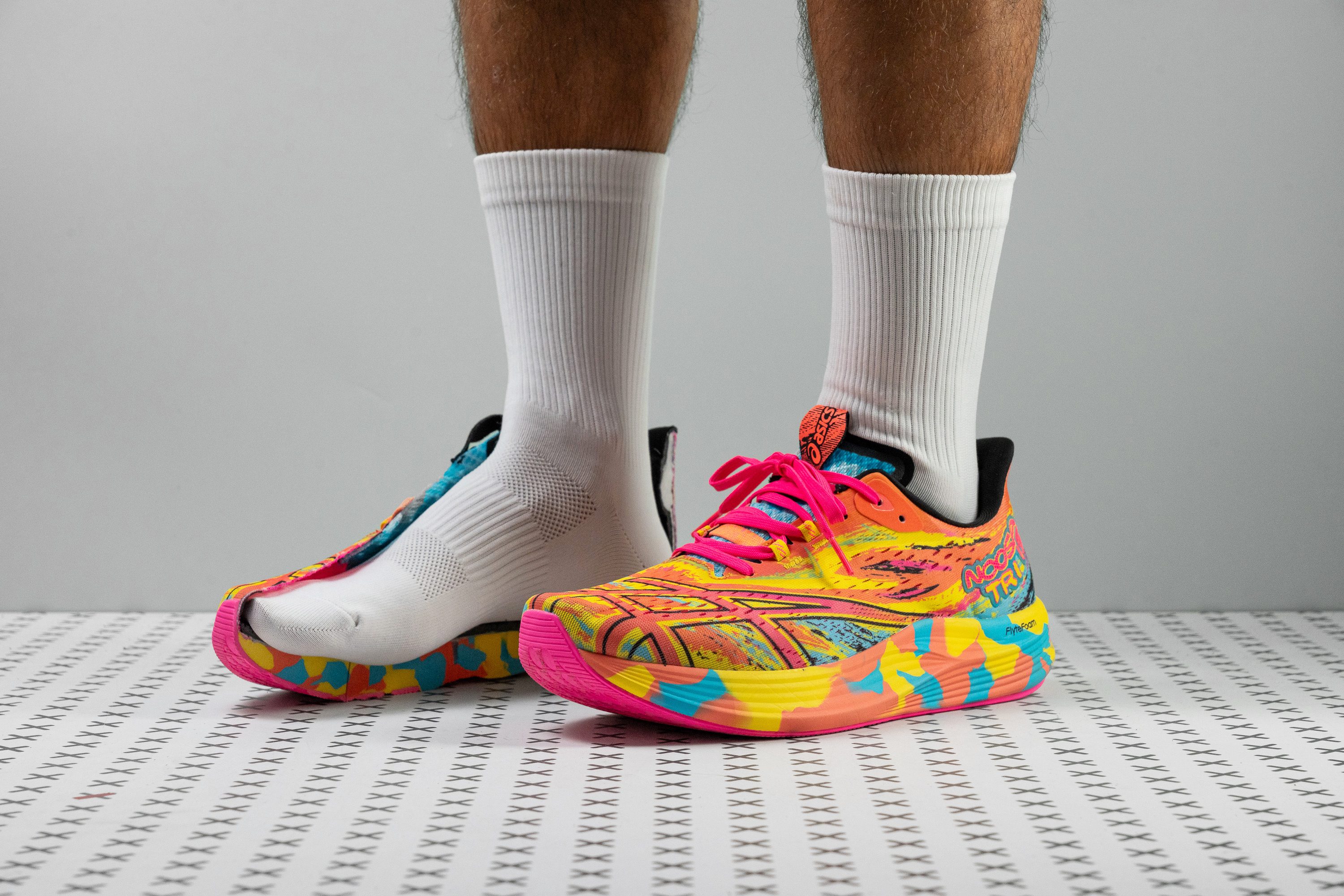Our verdict
- Top pick in best competition running shoes (2023)
Pros
- Extremely lightweight
- Well-cushioned for long runs
- Specifically designed for triathlons
- Unique design
- Breathable and comfortable upper
- Long-lasting outsole
- Suitable for sock-free running
- Excellent value at $130
- Excellent value at $130
Cons
- Underwhelming energy return
- Tongue might be too thin for some
- Not the best for heel strikers
Audience verdict
- Top 3% in road running shoes
- Top 5% in ASICS running shoes
Comparison
The most similar running shoes compared
+ + Add a shoe | |||||
|---|---|---|---|---|---|
| Audience score | 92 Superb! | 89 Great! | 84 Good! | 92 Superb! | |
| Price | £135 | £80 | £135 | £130 | |
| Pace | Daily runningTempo | Daily running | Daily runningTempo | Daily running | |
| Shock absorption | High | Low | Moderate | High | |
| Energy return | Low | Low | Low | Moderate | |
| Traction | Moderate | Low | High | Moderate | |
| Arch support | Neutral | Neutral | Neutral | Neutral | |
| Weight lab Weight brand | 7.7 oz / 218g 7.8 oz / 221g | 8.5 oz / 241g 9.2 oz / 260g | 7.7 oz / 217g 7.6 oz / 215g | 10.1 oz / 285g 9.7 oz / 275g | |
| Lightweight | ✓ | ✓ | ✓ | ✗ | |
| Drop lab Drop brand | 7.7 mm 5.0 mm | 9.3 mm 10.0 mm | 5.9 mm 5.0 mm | 6.5 mm 6.0 mm | |
| Strike pattern | Mid/forefoot | HeelMid/forefoot | Mid/forefoot | Mid/forefoot | |
| Size | Slightly small | True to size | Half size small | True to size | |
| Midsole softness | Soft | Balanced | Soft | Soft | |
| Difference in midsole softness in cold | Small | Normal | Small | Normal | |
| Toebox durability | Bad | Good | Bad | Decent | |
| Heel padding durability | Good | Good | Good | Bad | |
| Outsole durability | Good | Decent | Decent | Good | |
| Breathability | Breathable | Breathable | Breathable | Moderate | |
| Width / fit | Wide | Medium | Wide | Narrow | |
| Toebox width | Medium | Medium | Wide | Medium | |
| Stiffness | Moderate | Moderate | Moderate | Moderate | |
| Torsional rigidity | Stiff | Moderate | Stiff | Stiff | |
| Heel counter stiffness | Moderate | Moderate | Moderate | Moderate | |
| Rocker | ✓ | ✗ | ✗ | ✓ | |
| Heel lab Heel brand | 34.6 mm 34.0 mm | 29.7 mm 30.0 mm | 32.8 mm 34.5 mm | 34.1 mm 38.0 mm | |
| Forefoot lab Forefoot brand | 26.9 mm 29.0 mm | 20.4 mm 20.0 mm | 26.9 mm 29.5 mm | 27.6 mm 32.0 mm | |
| Widths available | Normal | Normal | Normal | Normal | |
| Orthotic friendly | ✓ | ✓ | ✓ | ✓ | |
| Season | SummerAll seasons | SummerAll seasons | SummerAll seasons | All seasons | |
| Removable insole | ✓ | ✓ | ✓ | ✓ | |
| Ranking | #17 Top 3% | #116 Top 31% | #253 Bottom 33% | #6 Top 2% | |
| Popularity | #341 Top 50% | #127 Top 34% | #136 Top 36% | #265 Bottom 30% |
Who should buy
We think the ASICS Noosa Tri 15 is a top choice for:
- Runners looking for a lightweight, non-plated option for both fast-paced training and racing.
- Triathletes who need a shoe that can handle sock-free runs, track workouts, and interval training.
- Anyone seeking a running shoe with a unique design and impressive versatility for various running speeds.
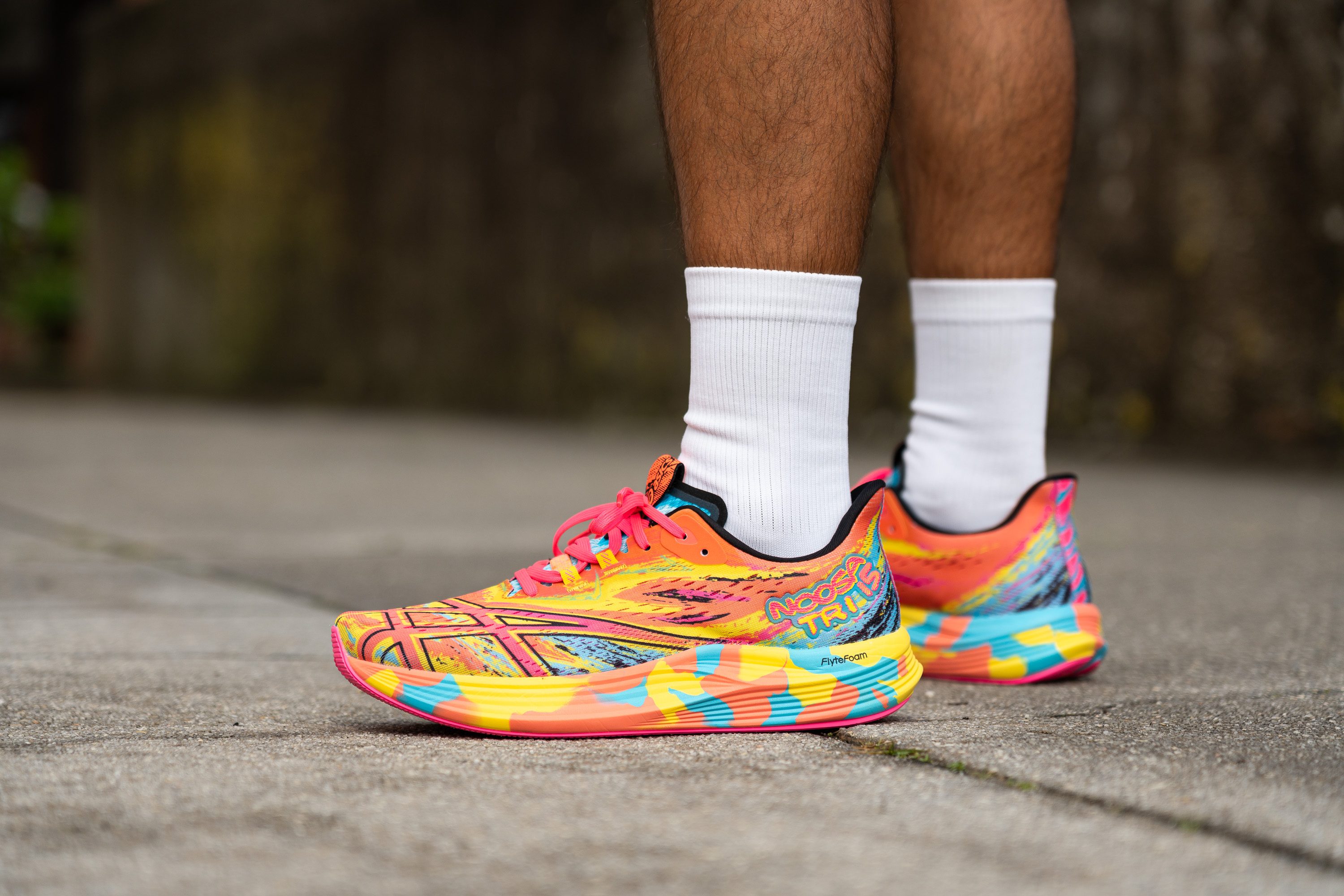
Who should NOT buy
If you're after world-class performance, we believe this shoe is not for you. Though it's speedy, it lacks a carbon plate and PEBA foam, limiting its energy return. Consider the ASICS Metaspeed Edge+ or the Nike Streakfly instead.
Runners who use a heel-striking technique should also think twice about the Noosa Tri 15. Its rearfoot is notably narrow, so we suggest opting for wider-heeled alternatives like the PUMA Deviate Nitro 2 or the Saucony Endorphin Speed 3.
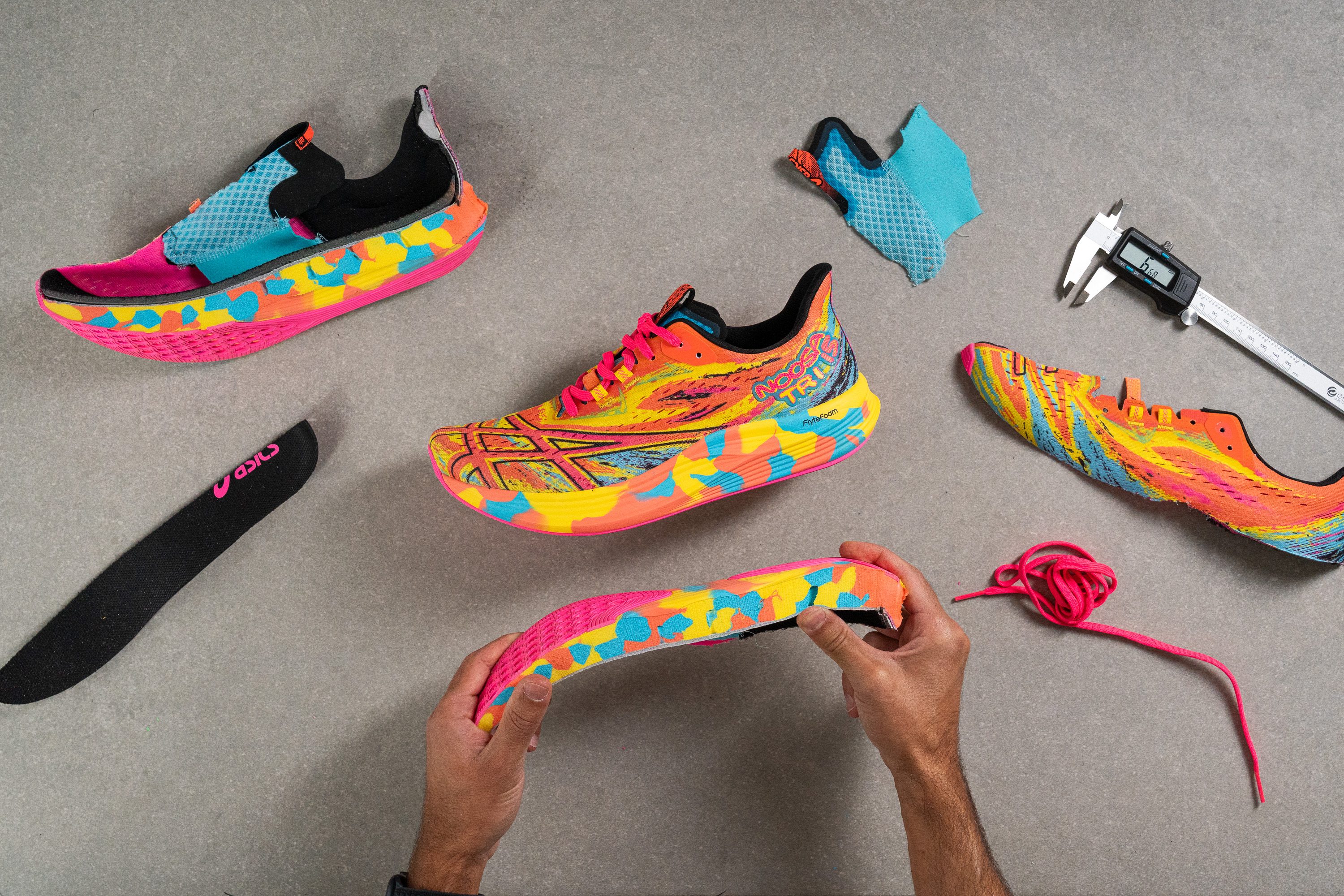
Cushioning
The tongue is semi-gusseted, an essential feature in a triathlon-focused shoe that helps prevent any unwanted movement.
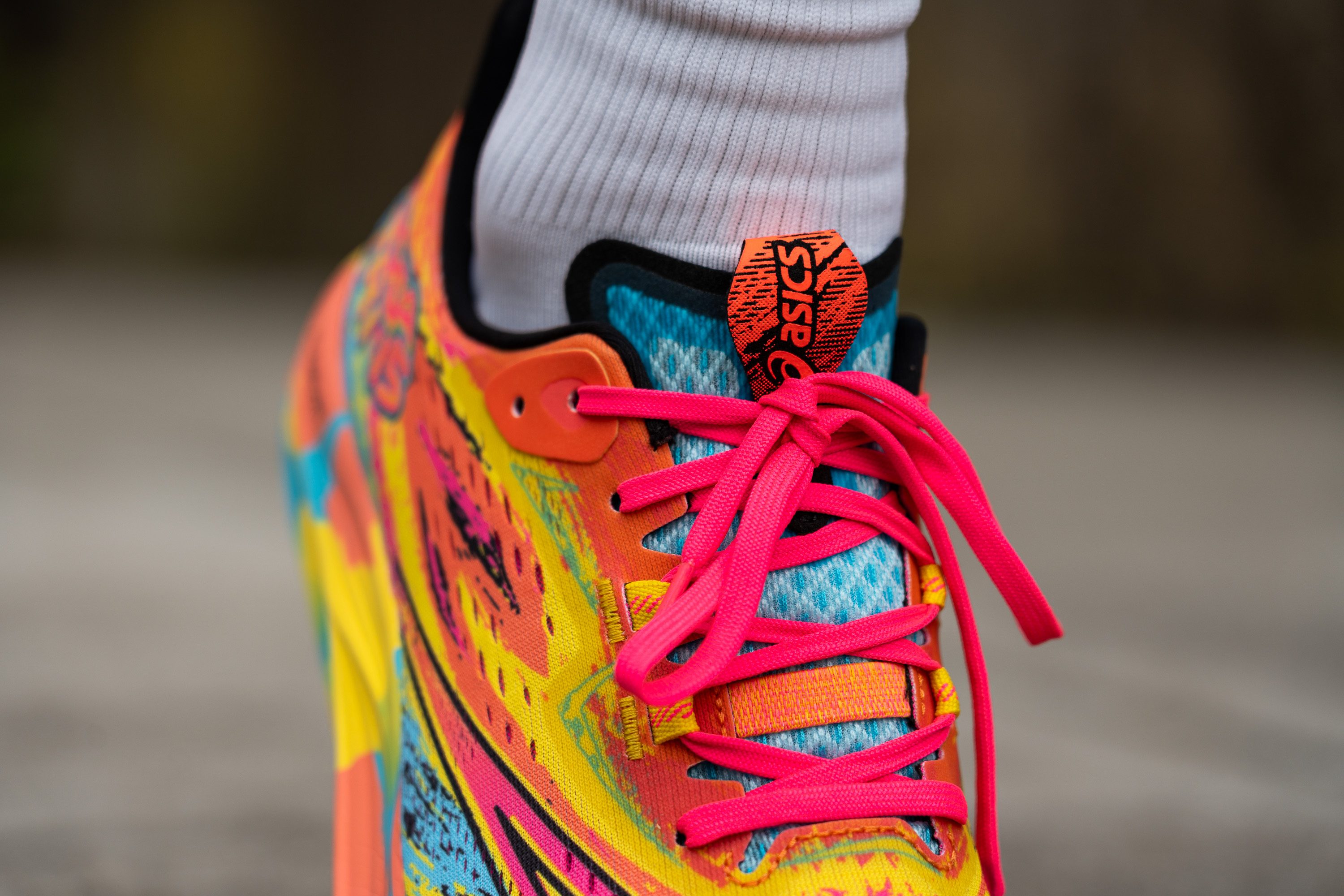
ASICS has also cleverly included a tongue tab, not just to make putting the shoe on quicker and easier, but also to improve transitions from bike to run.
Shock absorption
The bizarre look of the Noosa Tri 15 makes it tough to guess its impact dampening, but after a few runs, we clearly felt it was above average—a big leap from its predecessors. Later in the lab, our measurements confirmed it with a solid 135 SA, backing up our impressions.
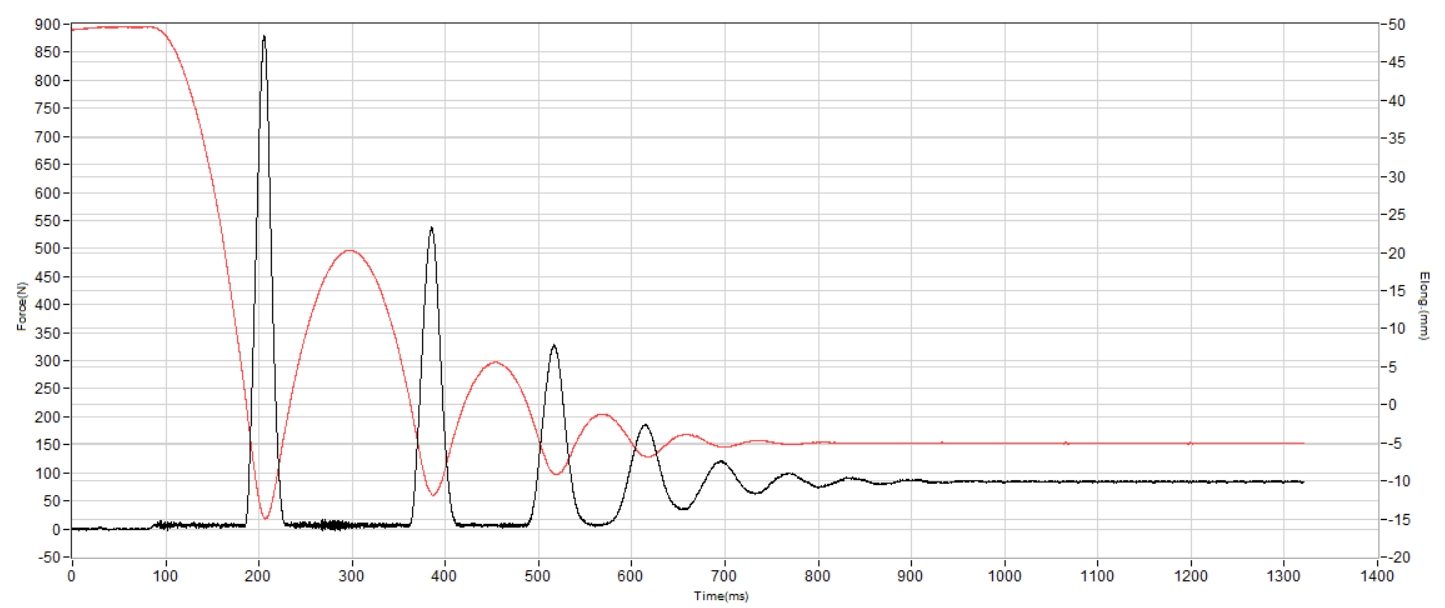
| Noosa Tri 15 | 135 SA |
| Average | 130 SA |
Energy return
With FF Blast under the hood, we weren’t expecting much in terms of energy return—and sadly, we were right. It delivered a disappointing 46.9% bounce in the heel. The forefoot did slightly better at 49.8%, but that’s still shockingly low for a shoe pitched as suitable for fast paces.
| Noosa Tri 15 | 46.9% |
| Average | 58.6% |
Heel stack
One of the main gripes from past users of the Noosa line was that the shoe could have more cushioning for long-distance races. Addressing this concern, ASICS has impressively bumped up the heel stack from 30.2 mm in the Noosa Tri 14 to a plush 34.6 mm in the Noosa Tri 15.
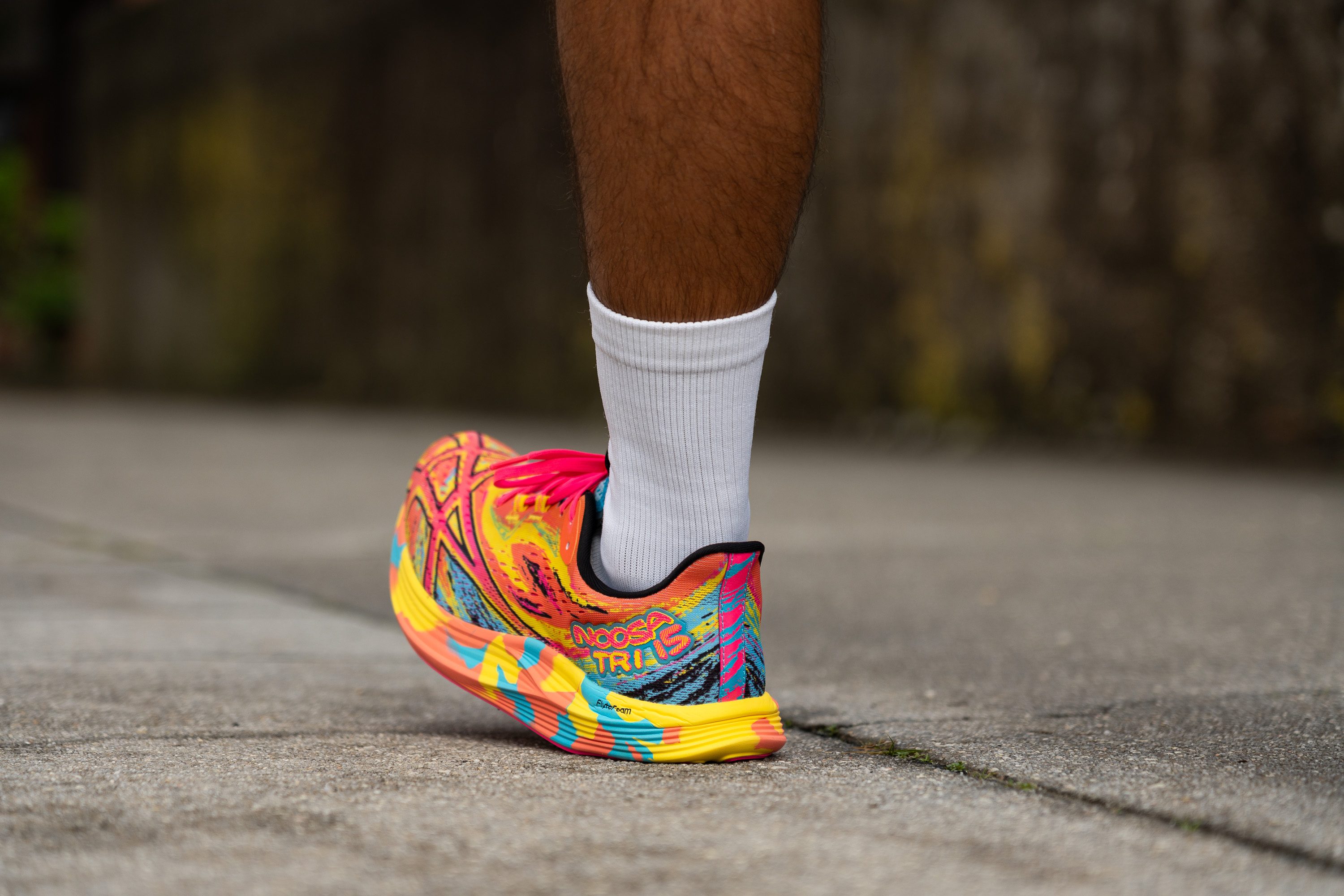
What's even more astounding is that the v15 weighs just 0.2 oz (5g) more than its predecessor. This is a significant improvement that makes the Noosa Tri 15 an great choice for long runs, as it delivers more cushion than ever without any significant weight increase.
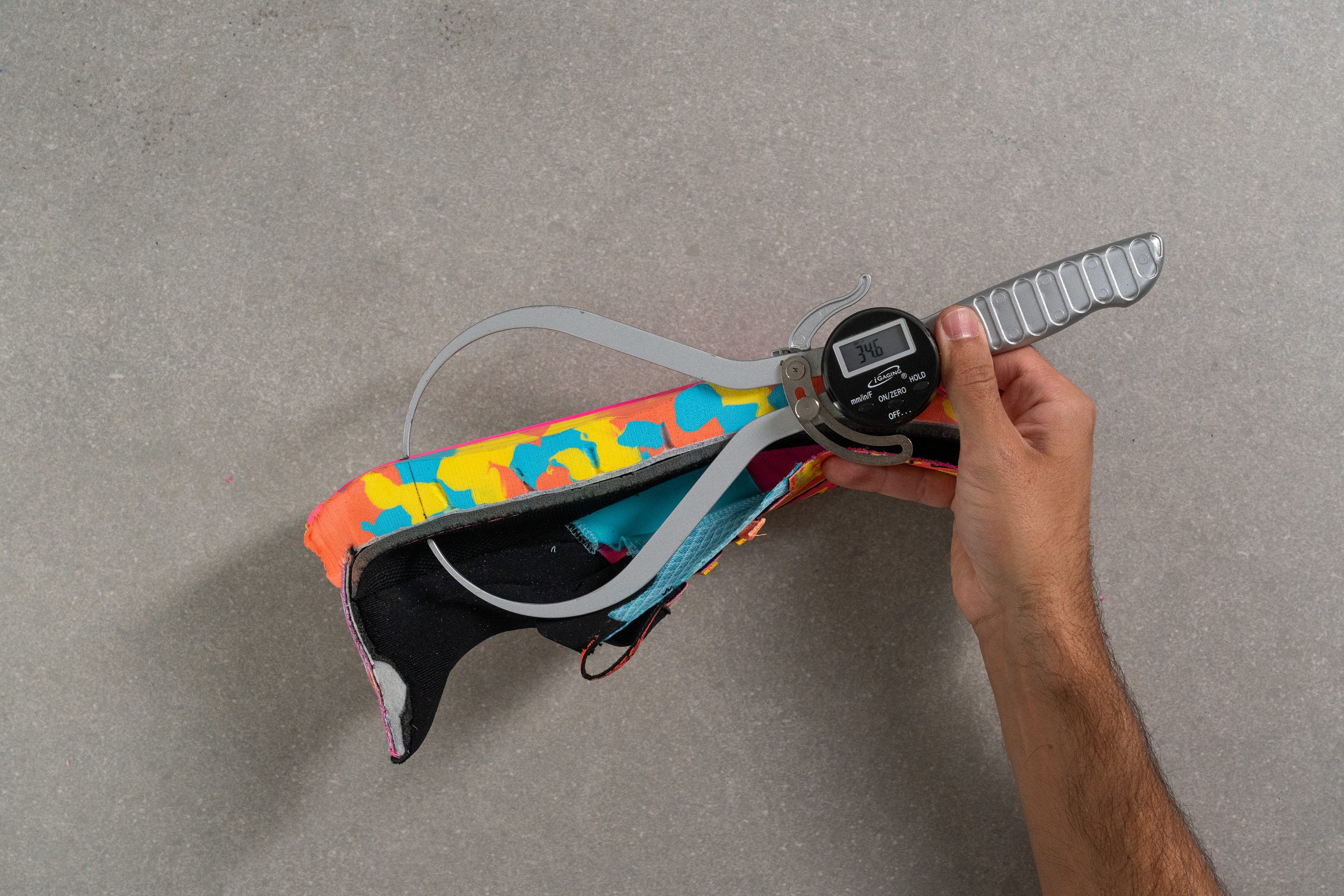
| Noosa Tri 15 | 34.6 mm |
| Average | 34.8 mm |
Forefoot stack
In our measurements, the forefoot thickness has also increased from the previous version. It's now at 26.9 mm, up from 22.2 mm.
That's a notable 4.7-mm jump that will surely be loved by forefoot strikers. While making this change, we found in our test runs that some of the classic ground feel unique to the Noosa Tri is reduced, but not completely gone.
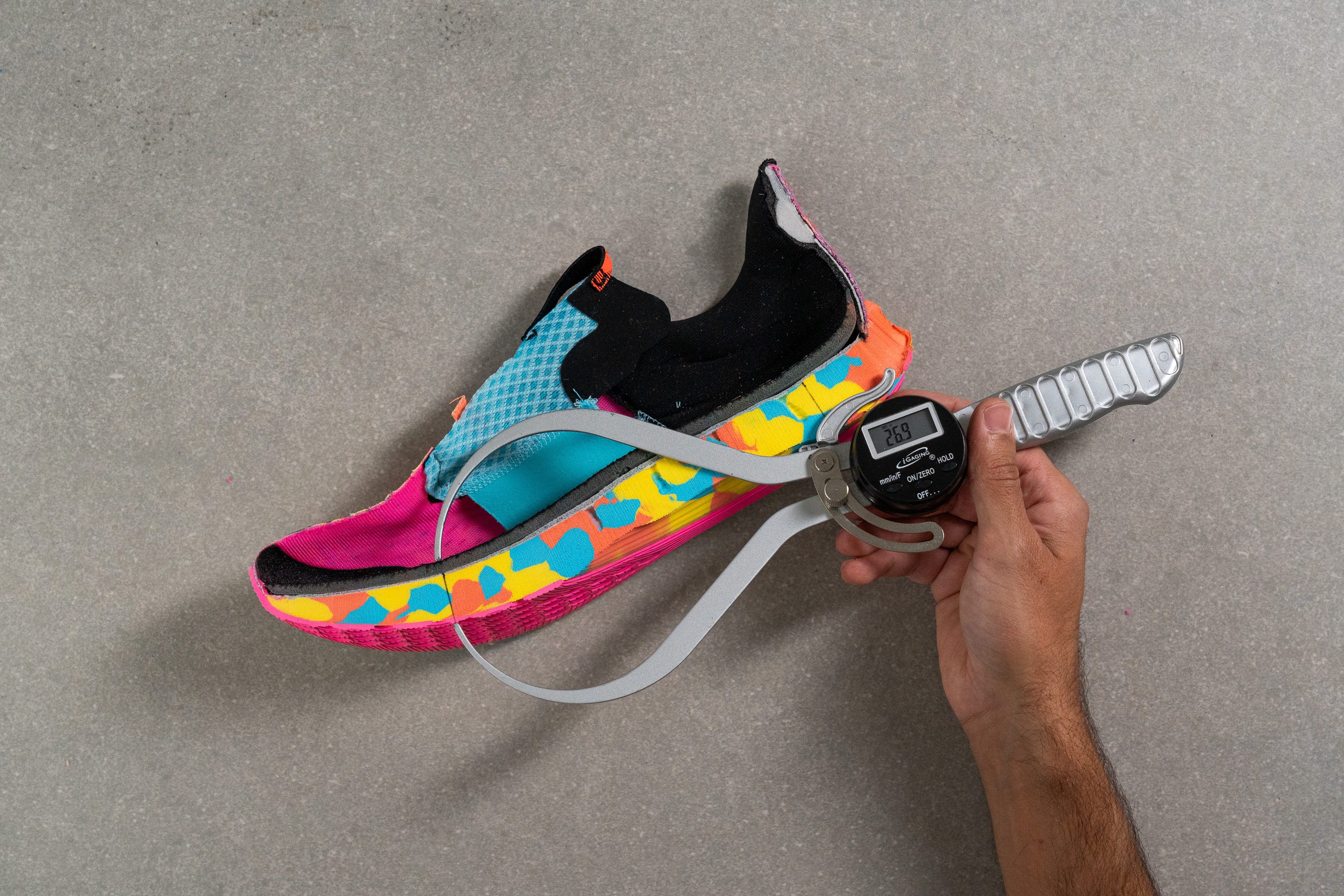
| Noosa Tri 15 | 26.9 mm |
| Average | 26.2 mm |
Drop
ASICS advertises the Noosa Tri 15 as having a 5-mm heel-to-toe drop. However, our in-depth measurements tell a different story—we clocked the difference between the heel and the forefoot at 7.7 mm.
If you're curious about why there's such a gap, we offer a full guide on this topic, explaining that we follow the official World Athletics rules.
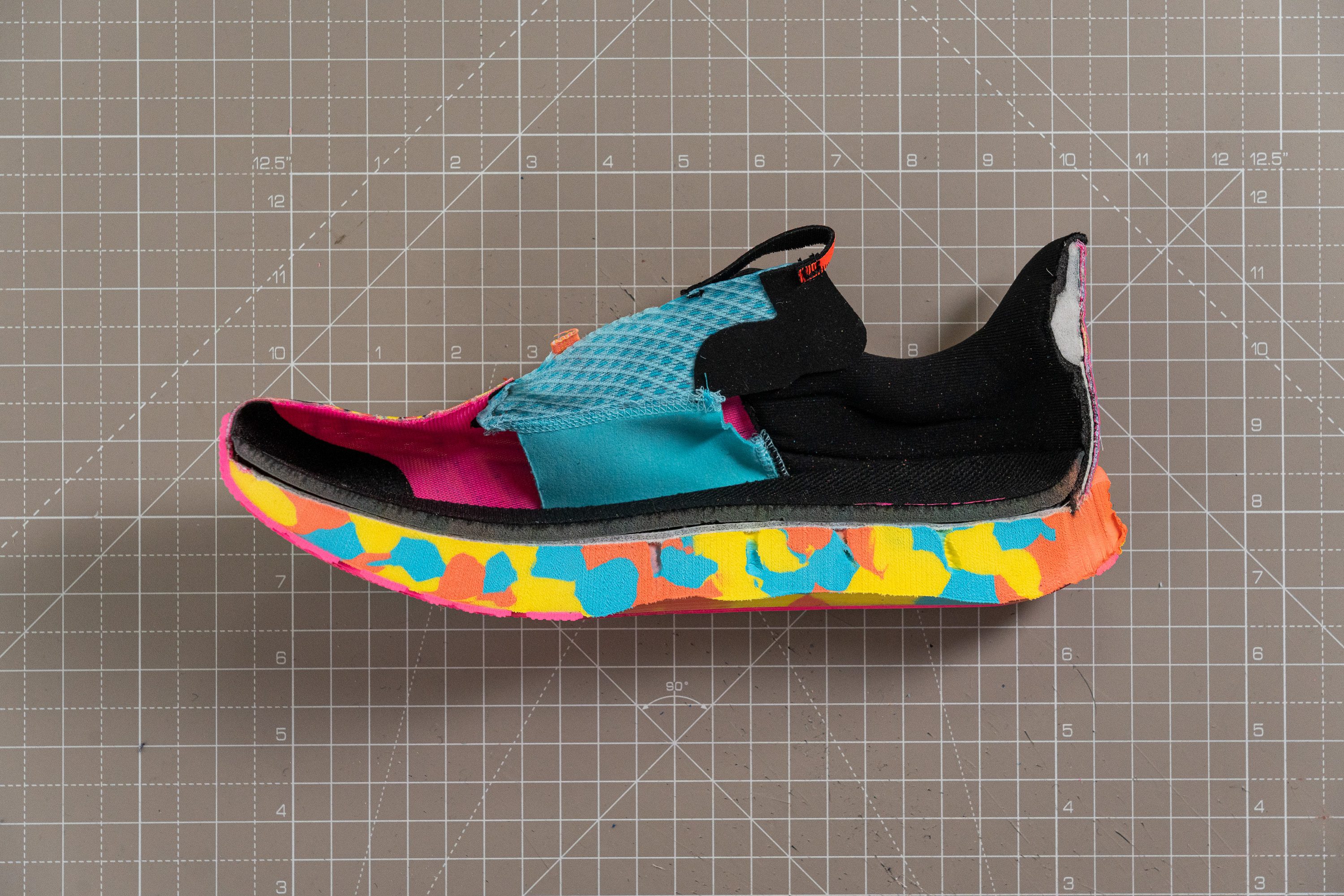
| Noosa Tri 15 | 7.7 mm |
| Average | 8.6 mm |
Midsole softness
One signature feature of the Noosa Tri has always been its cloud-like feel. While this was a comfort-plus for some, it bothered racers who found it too soft and mushy. To address this, the Tri 15 now has a firmer feel, measuring at 18.6 HA. Yet, it still offers a comfy ride.
The midsole is entirely composed of FlyteFoam Blast (EVA+OBC). While this isn't ASICS' premium foam, it's pretty good for a shoe priced at just £130.
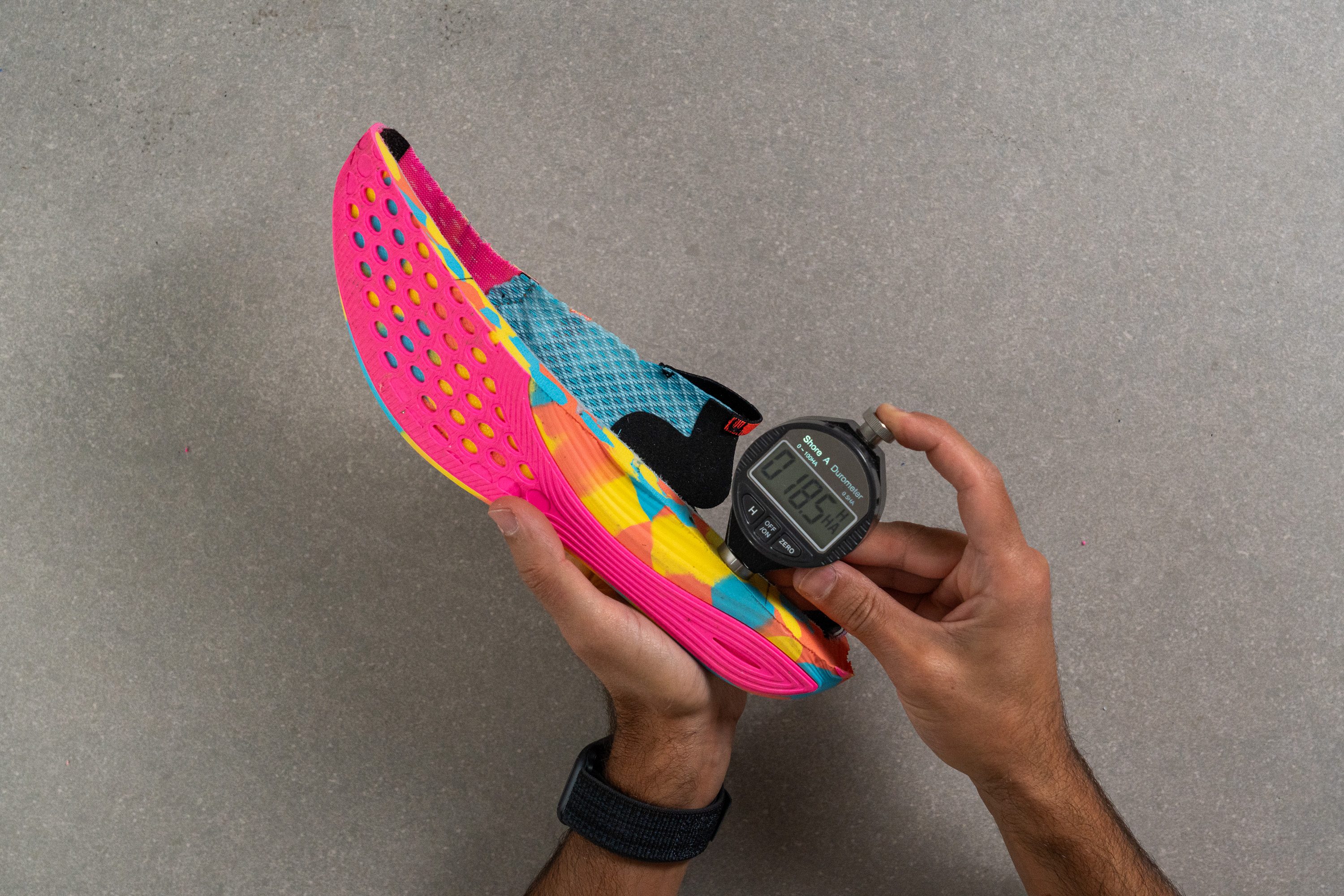
| Noosa Tri 15 | 18.6 HA |
| Average | 20.4 HA |
Size and fit
Size
ASICS Noosa Tri 15 fits slightly small (66 votes).
Internal length
| Noosa Tri 15 | 268.3 mm |
| Average | 269.4 mm |
Width / Fit
Moving to the fit, we discovered a pretty accommodating upper at 98.8 mm, which makes this shoe a nice choice for those who want a light, fast shoe but have slightly wider feet than the norm.
While it cannot be considered a wide shoe per se, it's among the widest and comfiest tempo/racing shoes on the market.
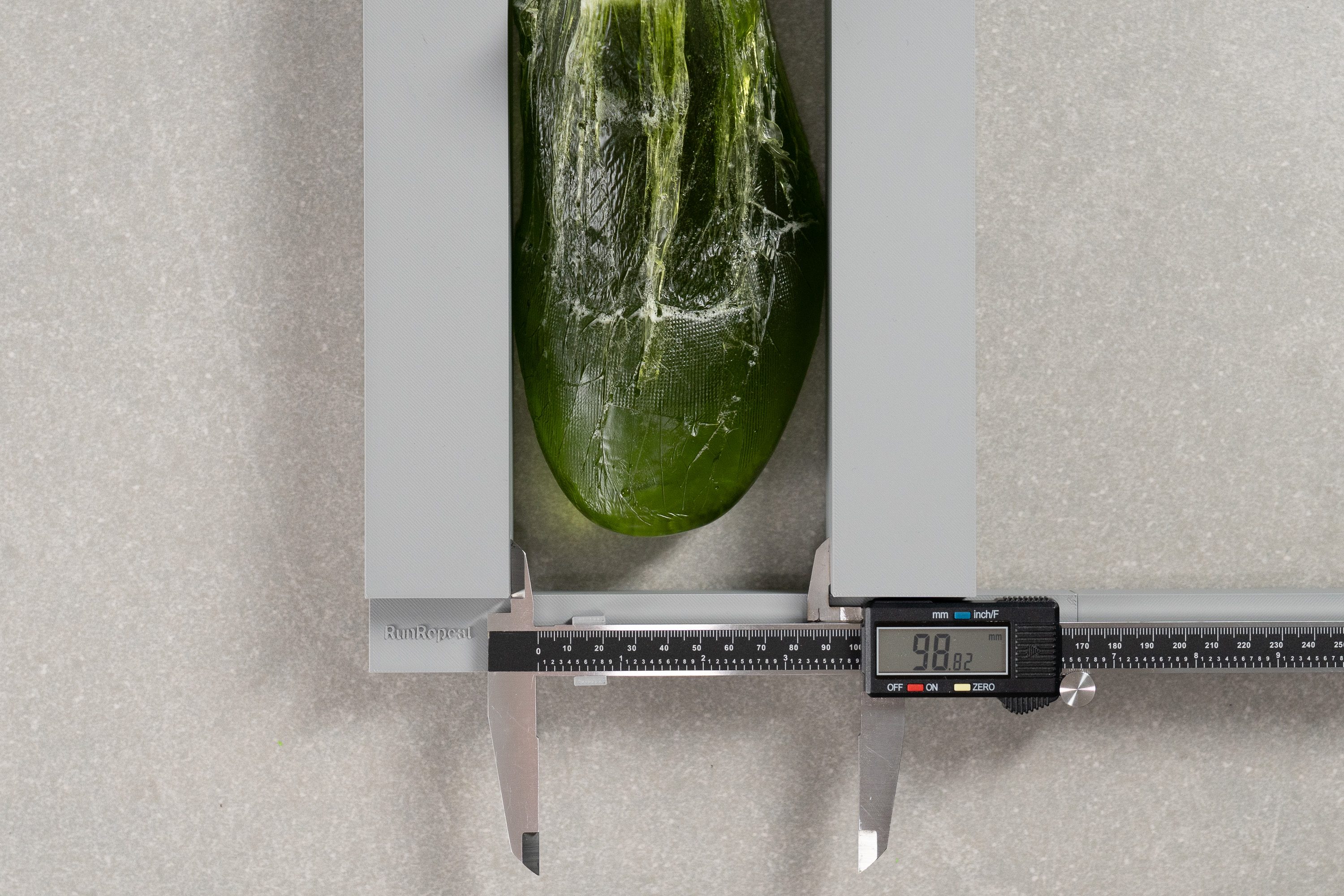
| Noosa Tri 15 | 98.8 mm |
| Average | 95.1 mm |
Toebox width
In the area around the big toe (73.9 mm), we observed a pretty standard design. The Noosa Tri 15 follows a regular width and unfortunately, there's no optional 2E size.
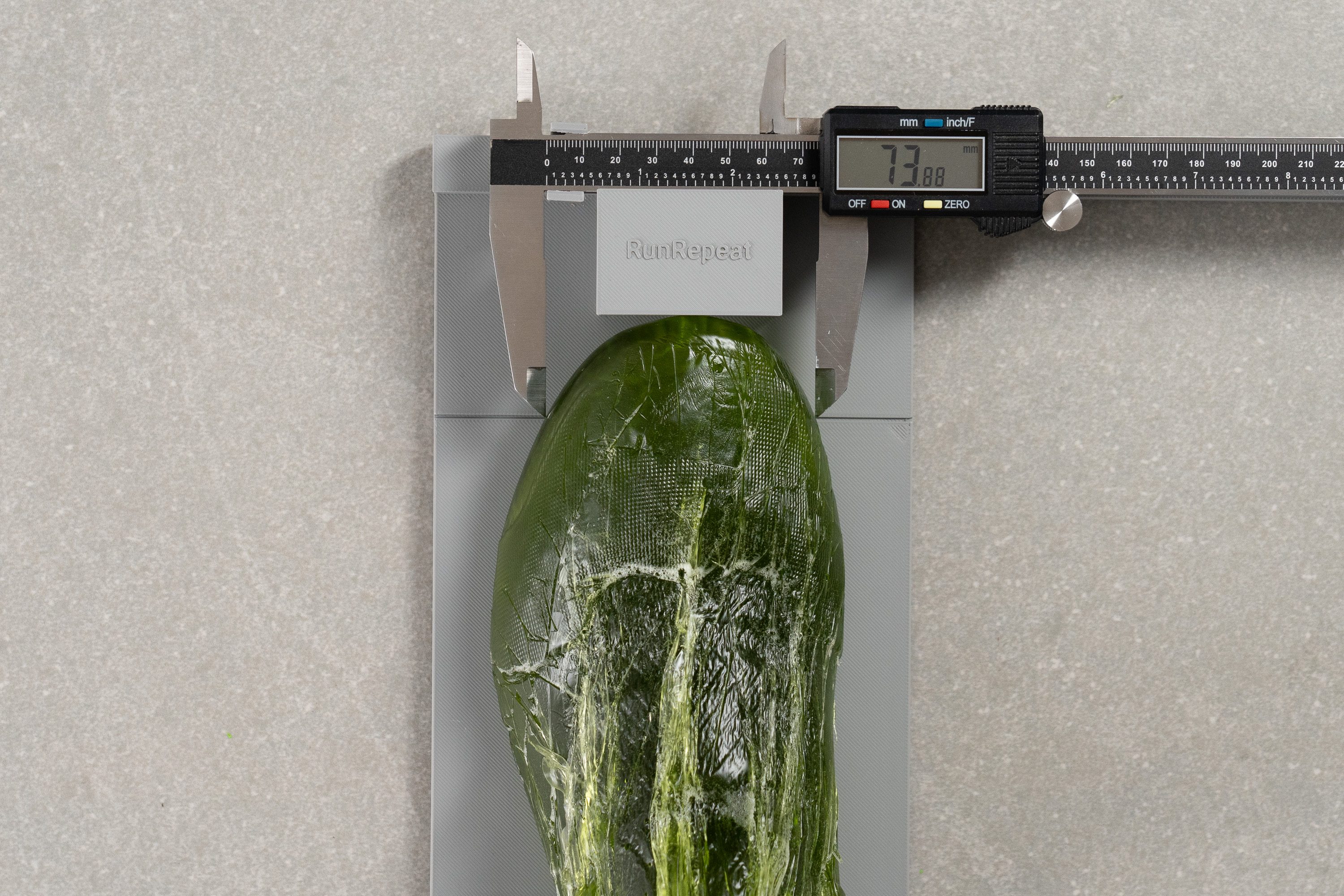
| Noosa Tri 15 | 73.9 mm |
| Average | 73.3 mm |
Toebox height
On the flip side, the toebox height is remarkably generous, making the Tri 15 an excellent choice for those with exceptional toe mobility who appreciate ample room for upward movement.
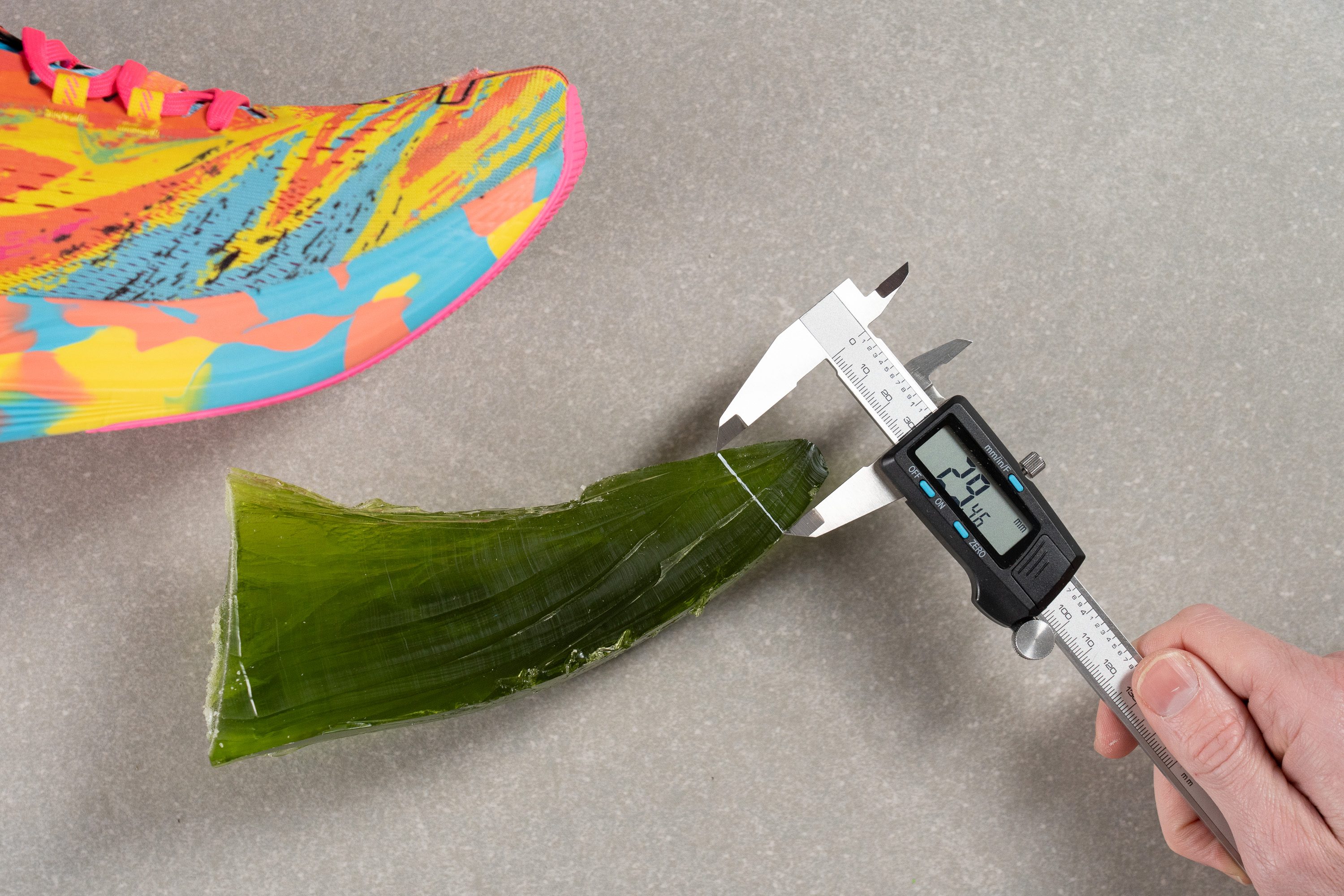
| Noosa Tri 15 | 29.5 mm |
| Average | 27.0 mm |
Traction / Grip
Traction test
Traction feels solid on dry surfaces, offering a secure and stable ride. However, we noticed the Noosa Tri 15 can get slightly slippery in wet conditions—nothing major, but noticeable. That said, for rain-heavy runs we recommend the Magic Speed 4, as it offers better all-weather confidence, especially on soaked roads.
| Noosa Tri 15 | 0.39 |
| Average | 0.49 |
Outsole design
The outsole of the Noosa Tri 15 blends colourful exposed EVA foam with selectively placed AHAR rubber in a Metaspeed-like design. Rubber coverage is partial, mainly limited to high-wear areas in the heel, lateral midfoot, and forefoot.
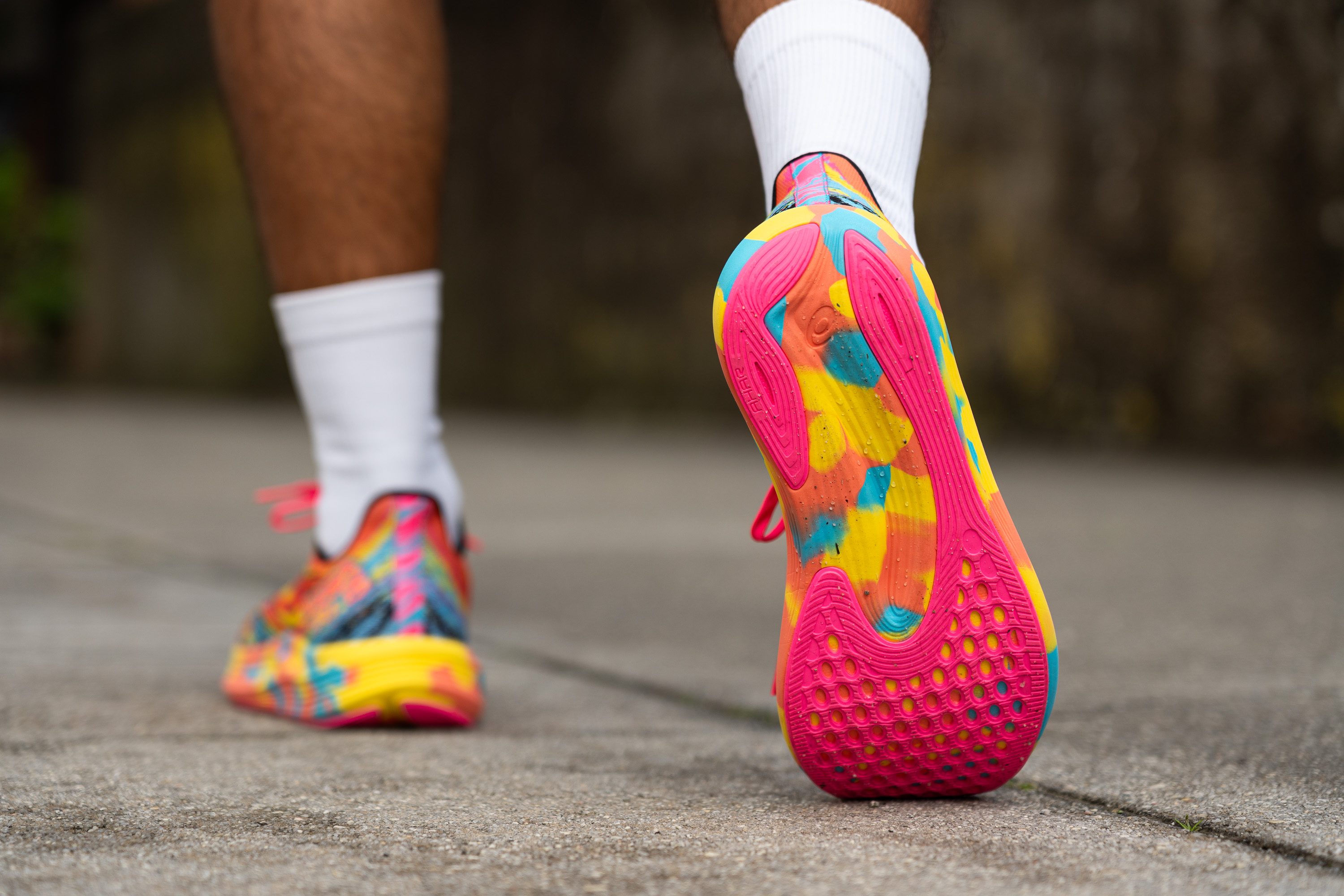
Flexibility / Stiffness
We measured 15.7N in our 30-degree flex test—a result that lands above the average and indicates a moderately stiff ride. Quite surprising for a plateless shoe!
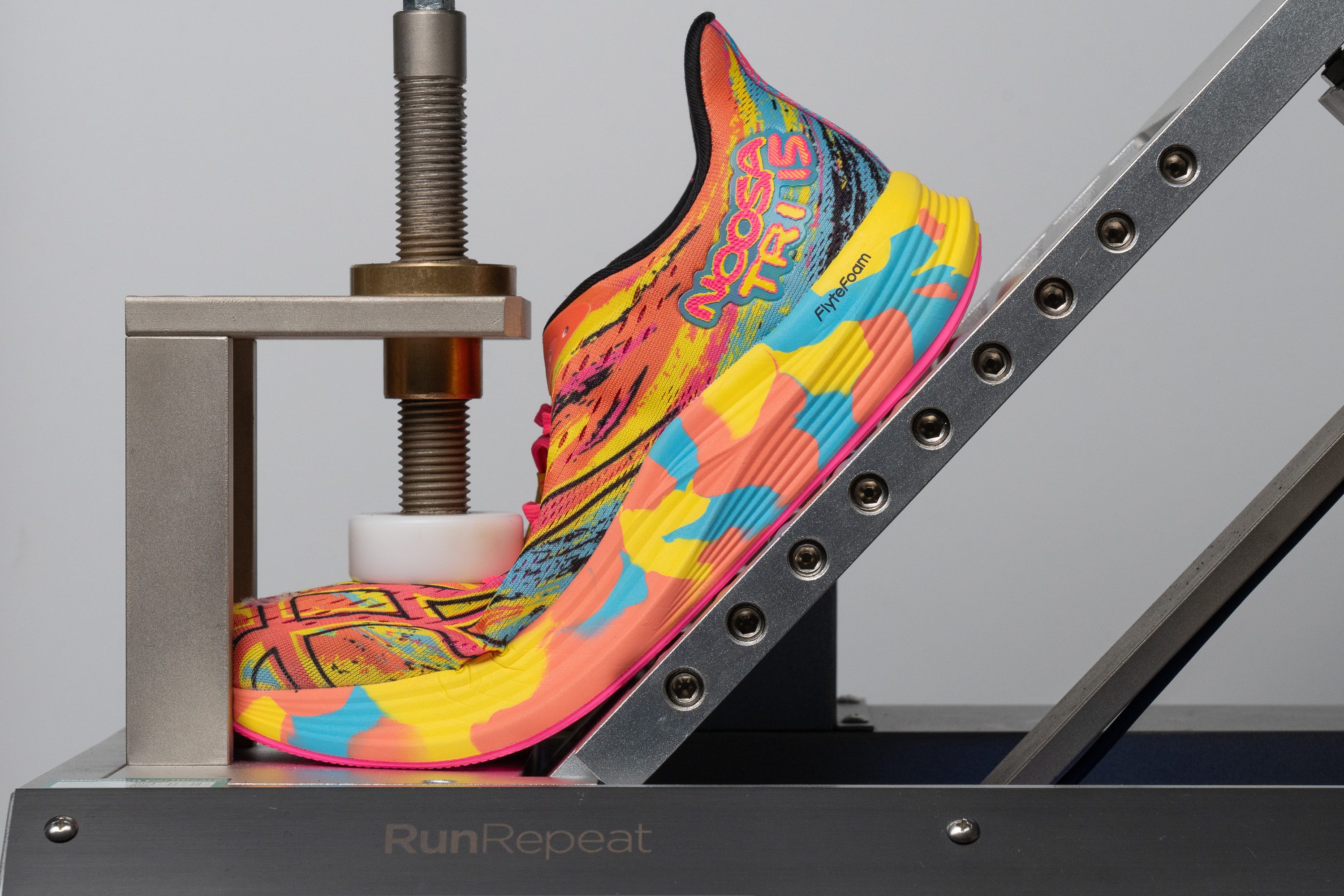
| Noosa Tri 15 | 15.7N |
| Average | 15.3N |
Stiffness in cold (%)
Just like we did for testing midsole softness, we put the shoe in the freezer to simulate cold conditions and ran the test again. This time, we gauged that the shoe required slightly more effort, needing 26.3N of force.
This is only a 26.4% increase, which easily outshines most other shoes on the market. We're impressed to see again that ASICS has really stepped up their game by enhancing the FlyteFoam Blast formula in this latest 15th edition of the Noosa Tri.
| Noosa Tri 15 | 26% |
| Average | 33% |
Weight
Weighing in at just 7.7 oz or 218g, we find the Noosa Tri 15 remarkably light, especially given its focus on both comfort and durability in key areas like the outsole.
For instance, it tips the scale at exactly the same weight as the Adidas Adios Pro 3, one of the best marathon racers in the market.
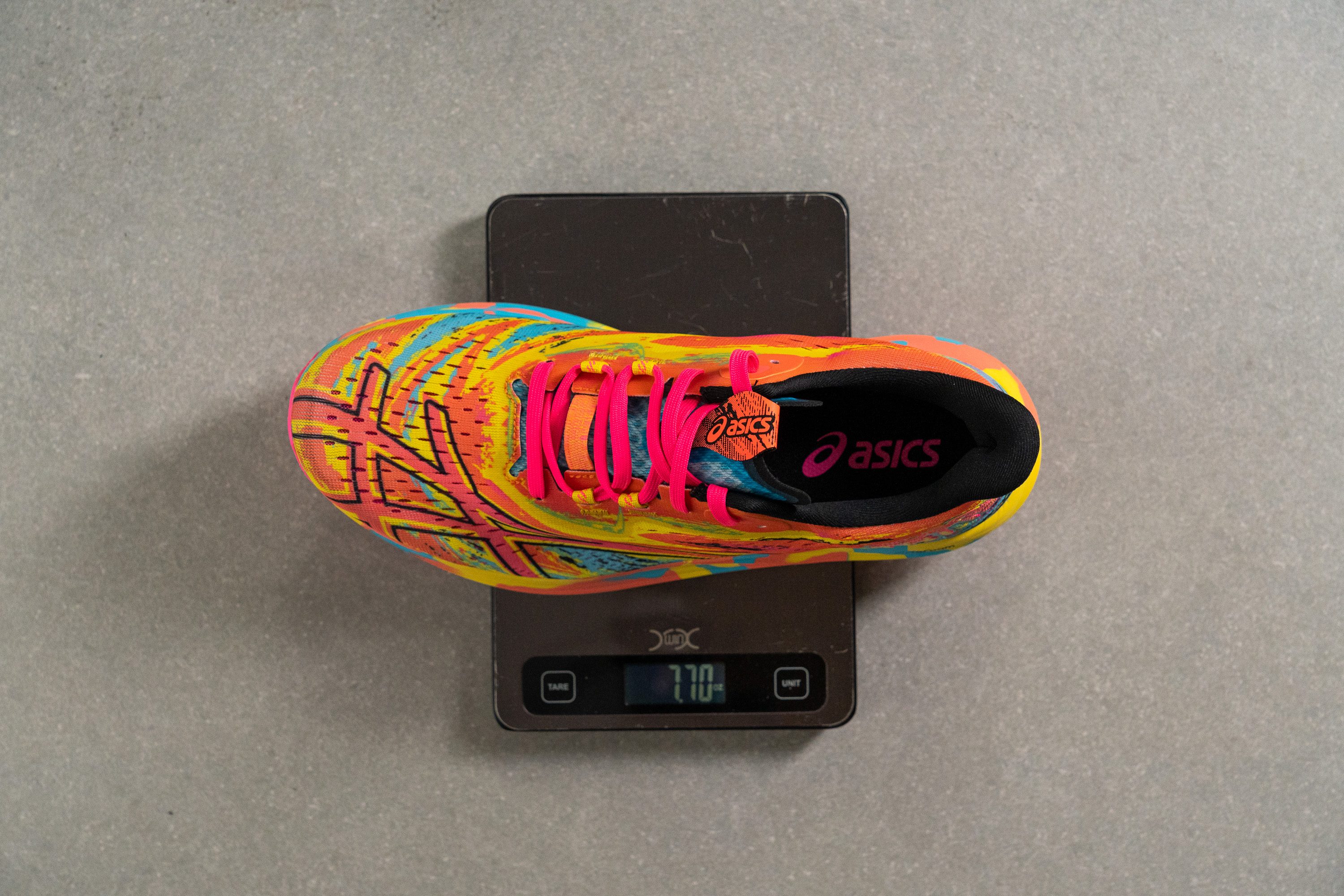
| Noosa Tri 15 | 7.7 oz (218g) |
| Average | 9.3 oz (264g) |
Breathability
The ASICS Noosa Tri line was originally designed for triathlon races, so it's gotta be breathable. Many triathletes like to race sock-free, after all!
We put the shoe through our cutting-edge breathability test, and let's just say our smoke machine and this shoe's upper are a perfect match. We gave the ventilation a 5/5 rating.
We also used our light to see how well the shoe breathes. In the toebox, we found excellent airflow, thanks to a combo of thin engineered mesh and ventilation holes. The midfoot is a bit more solid and thicker, so it's less breezy there.
To get a closer look at the toebox ventilation, we turned on our microscope.
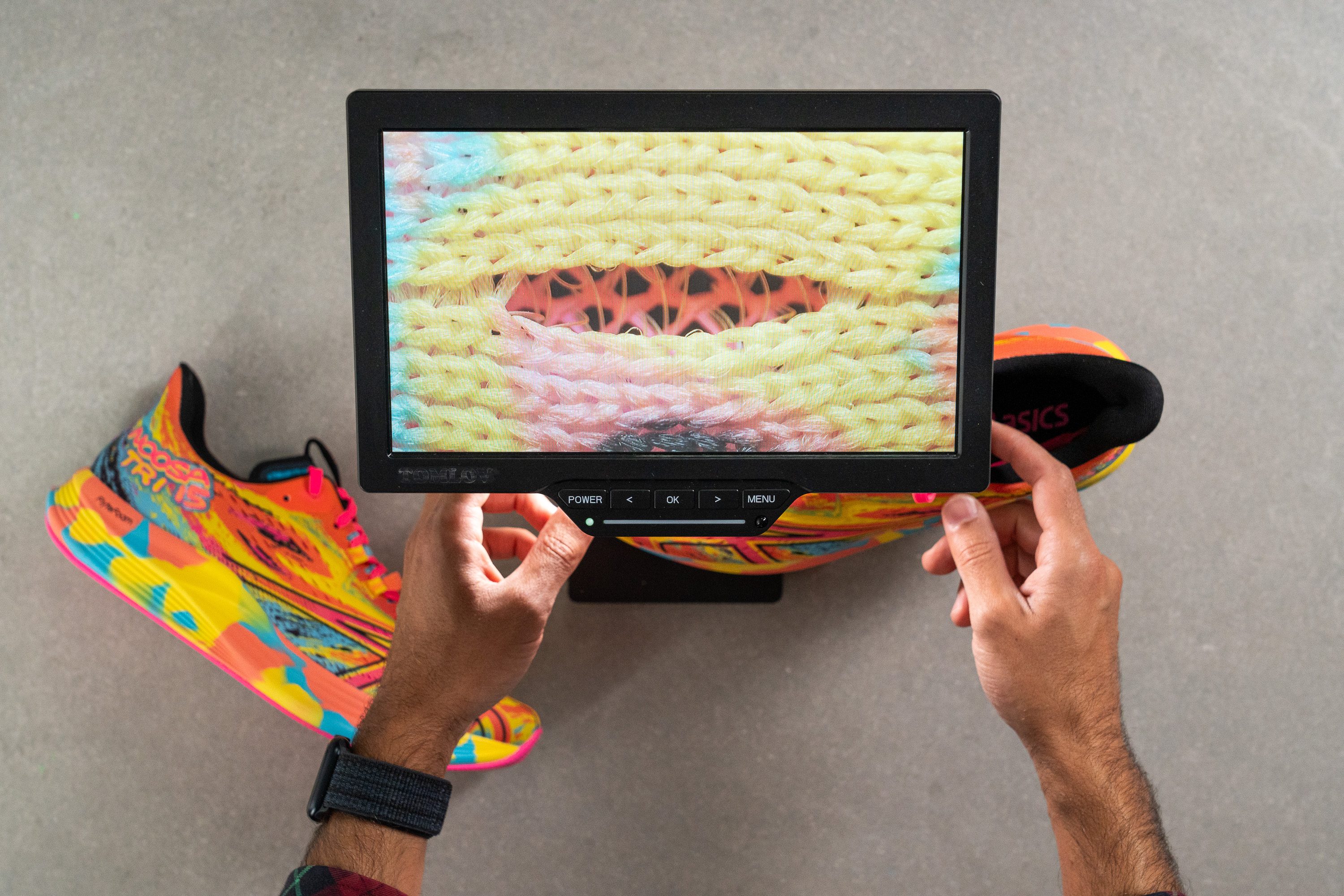
The holes here are top-notch, designed to keep air flowing while you run. Beneath these holes, another mesh layer adds rigidity to the upper, ensuring it stays in shape.
| Noosa Tri 15 | 5 |
| Average | 3.7 |
Stability
Lateral stability test
The Tri 15 felt stable to us, even though it's a completely neutral shoe. How did ASICS achieve this?
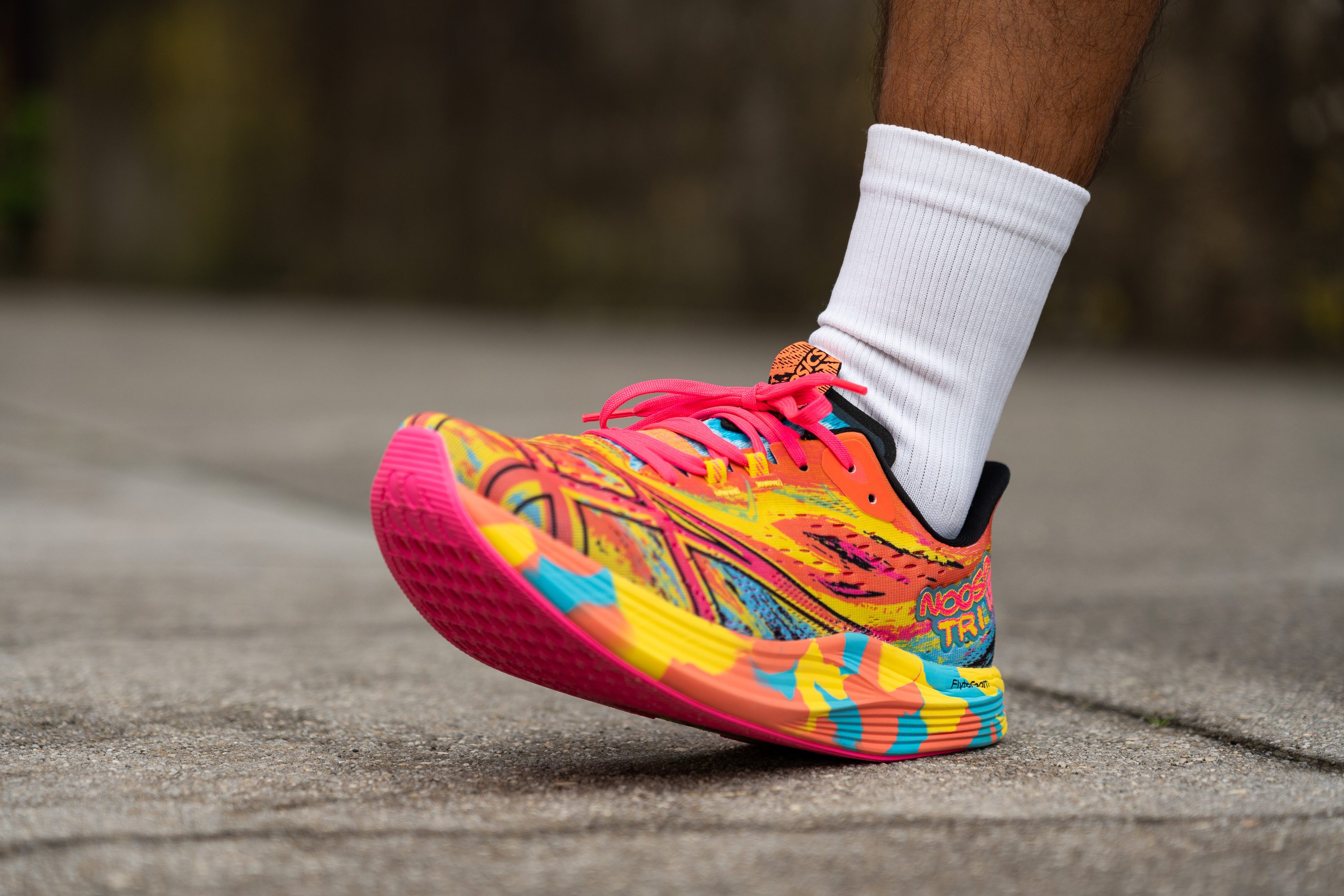
Partially, by incorporating distinct sidewalls that extend through the midfoot. This design allows your feet to sink into the Tri, almost like sitting in a bathtub, serving as a smart technique to enhance stability in a neutral shoe like this one.
Torsional rigidity
Another effective way to enhance stability in a neutral shoe is by making it stiff. In fact, this is one of the stiffest non-plated shoes we've ever tested in the lab.
Scoring a 5/5 in this category without the aid of a plate is incredibly rare.
| Noosa Tri 15 | 5 |
| Average | 3.5 |
Heel counter stiffness
The heel counter takes a different route, and we gave it a 3/5. This is a proven strategy that aligns with what most brands on the market are doing.
| Noosa Tri 15 | 3 |
| Average | 2.9 |
Midsole width - forefoot
Now we're turning our attention to sizing up the midsole dimensions.
In the forefoot, we measured a maximum width of 114.6 mm. This generous width offers plenty of stability and ensures secure landings, even when you're running at top speeds or doing track workouts.
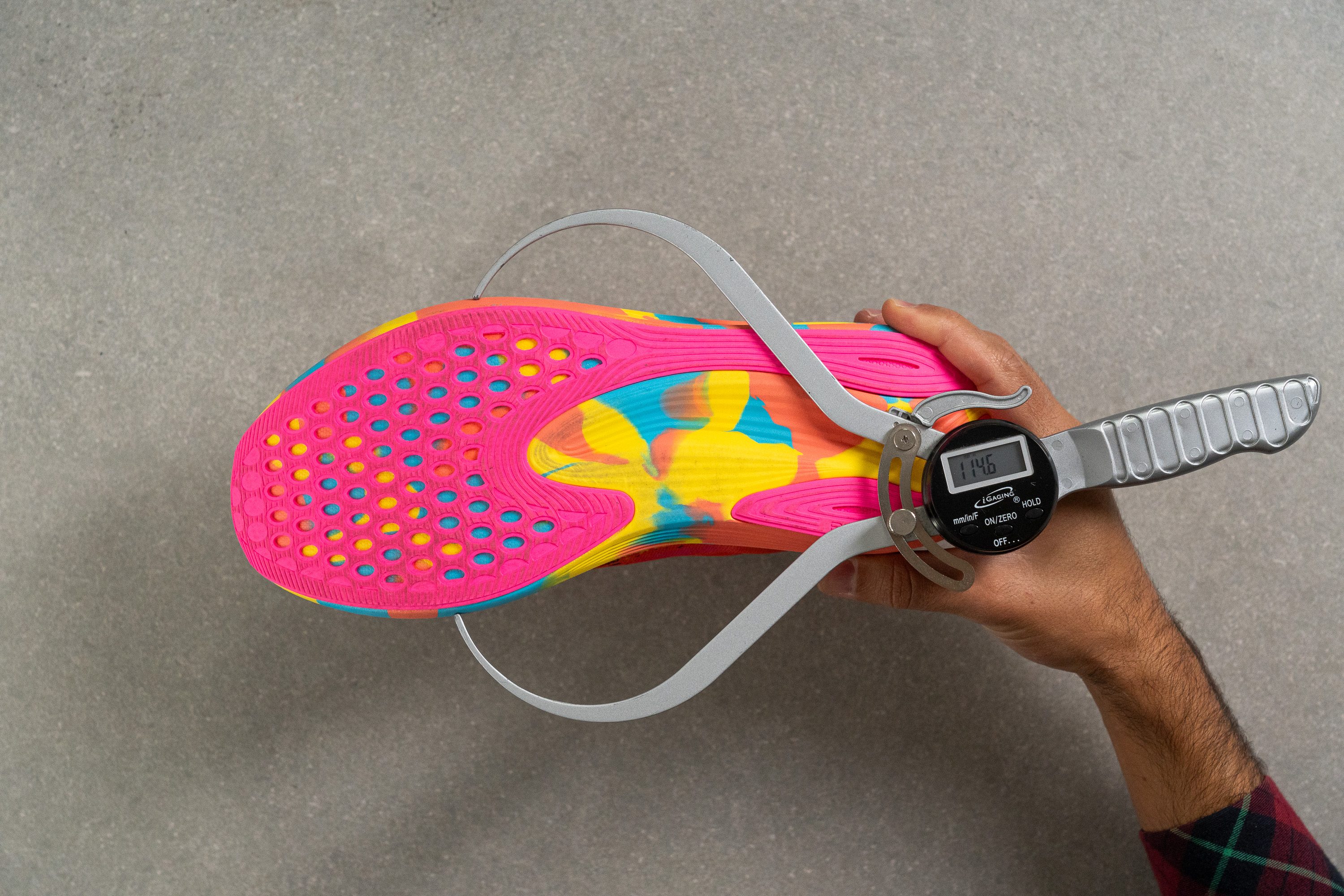
| Noosa Tri 15 | 114.6 mm |
| Average | 114.4 mm |
Midsole width - heel
The heel design is not meant for heel strikers. We measured the width and found it to be quite narrow at 82.9 mm.
However, keep in mind that this shoe is designed for fast-paced racing and training, targeting midfoot and forefoot strikers. We also observed some design features aimed at reducing weight, so the focus on speed makes sense.
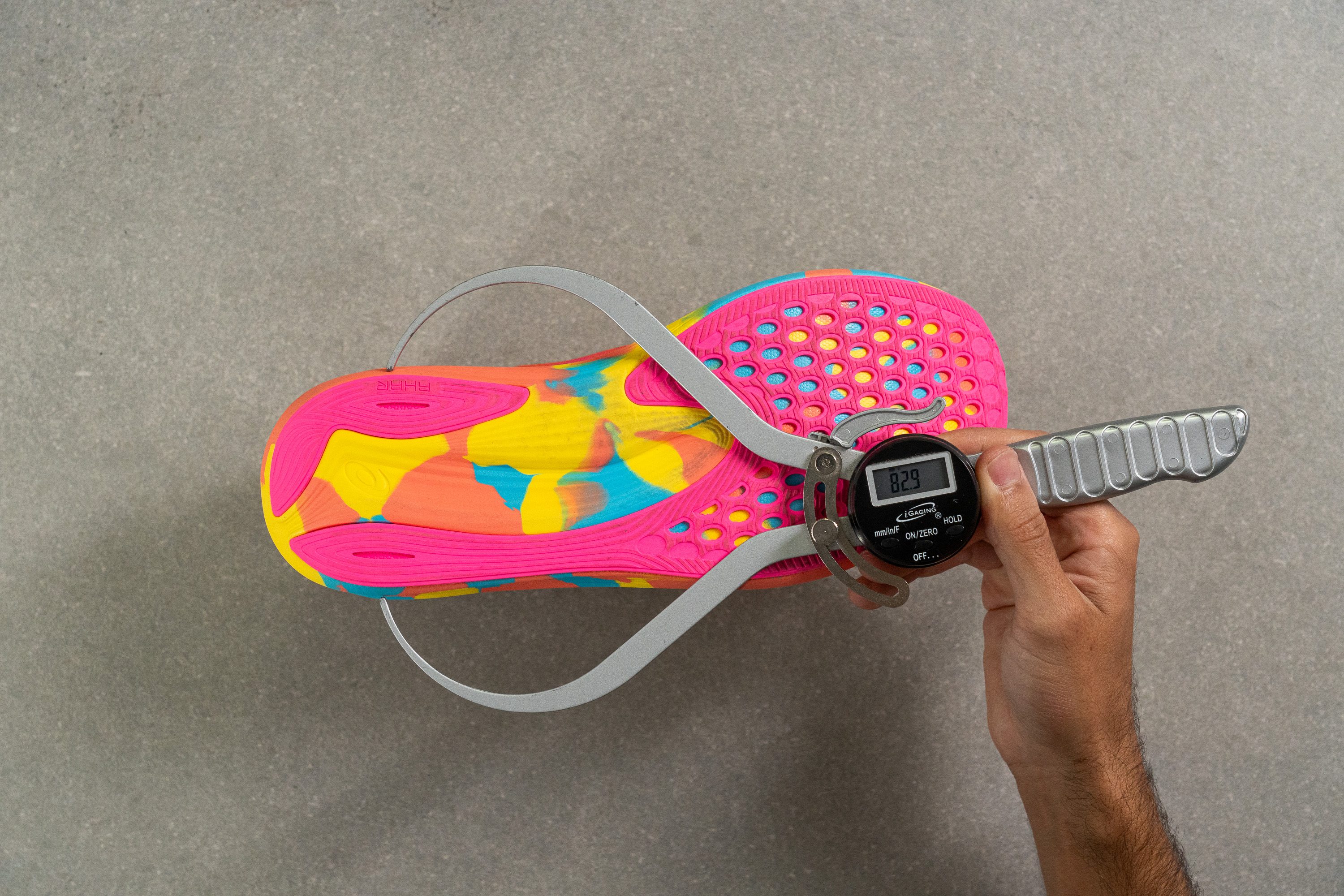
| Noosa Tri 15 | 82.9 mm |
| Average | 90.6 mm |
Durability
Toebox durability
We expected the Noosa Tri 15 to not hold up well in the durability test because of its super-thin mesh.
Sure enough, our Dremel test gave us disappointing results. It scored a 1 out of 5!
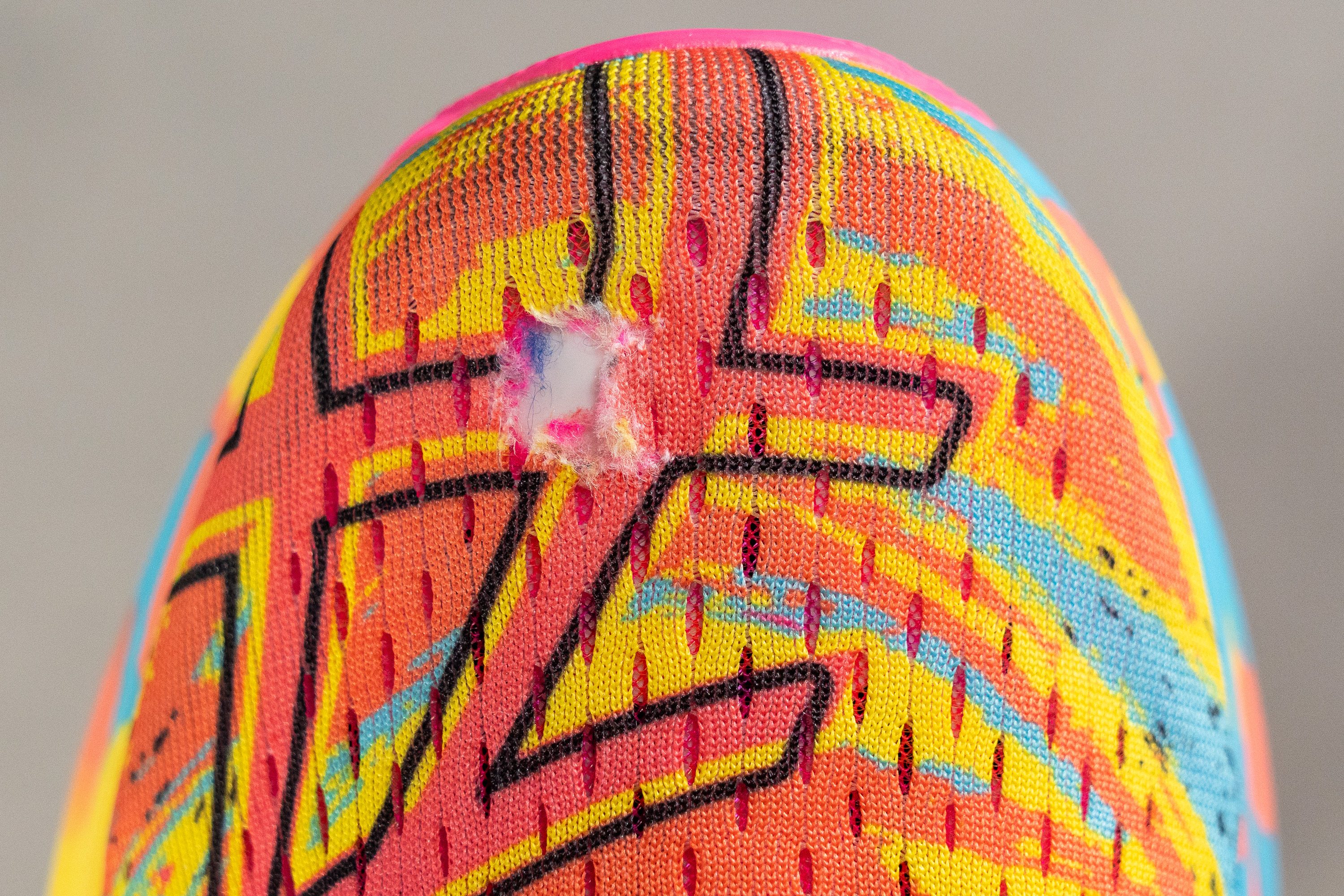
| Noosa Tri 15 | 1 |
| Average | 2.6 |
Heel padding durability
However, ASICS really wowed us by making an incredibly durable heel counter. In our second Dremel test, the shoe showed off an impressive performance by acing this challenge with a perfect 5 out of 5 score.
Now, there's a catch. Shoes designed for speedwork and racing often score well in this test because they have less padding than daily training shoes. But even with that in mind, we still think it's a standout performance.
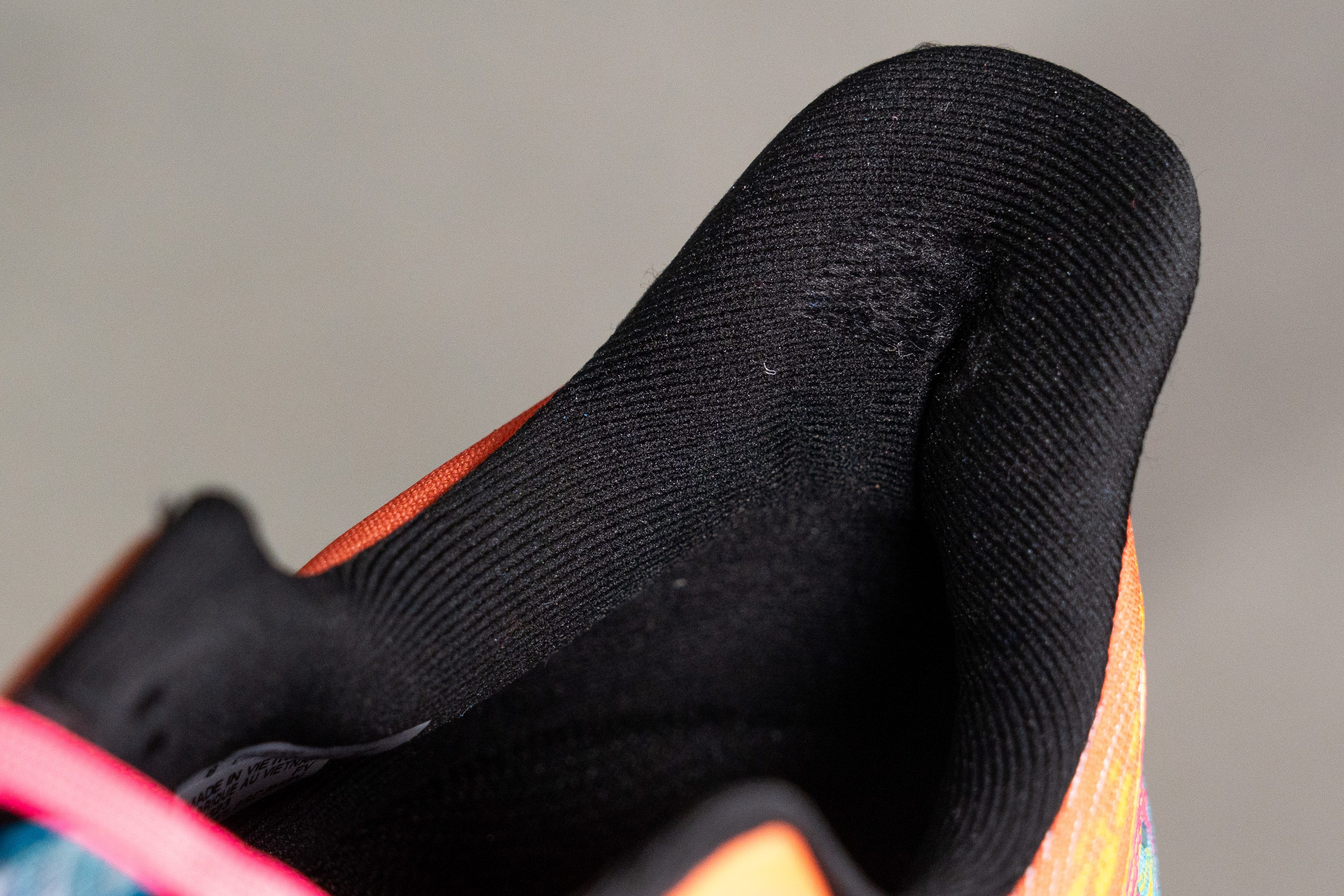
| Noosa Tri 15 | 5 |
| Average | 3.4 |
Outsole hardness
We flipped the shoe over to examine the outsole, really curious to see if the Noosa Tri 15 could be more than just a racing shoe—a solid training partner.

In our initial test in the lab, we gauged the outsole hardness at 83.9 HC, which is actually higher than average!
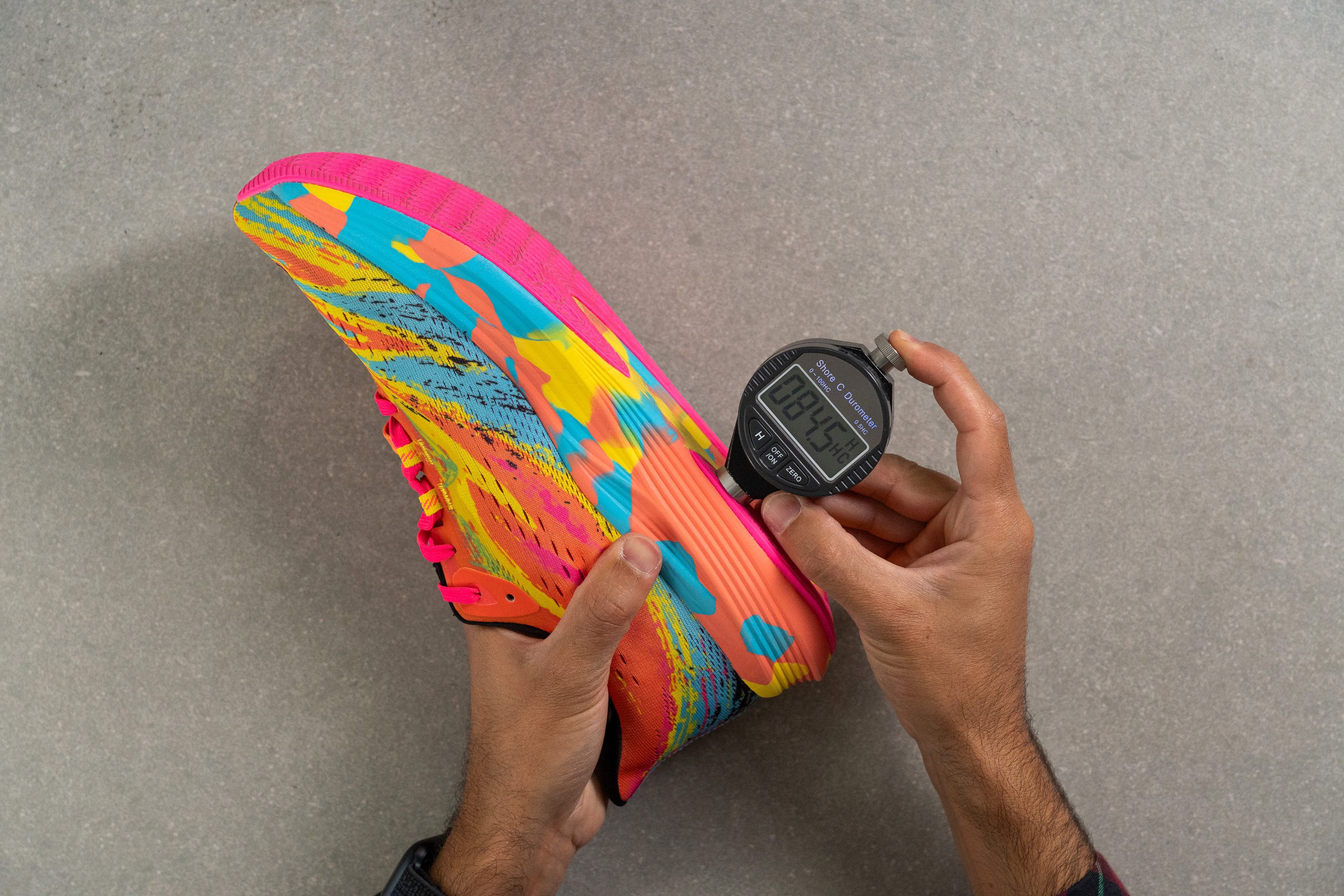
| Noosa Tri 15 | 83.9 HC |
| Average | 79.2 HC |
Outsole durability
ASICS really knocked it out of the park in terms of grip and durability for this shoe. They stepped it up by using their advanced AHARPLUS rubber instead of the standard AHAR. This upgraded material is usually reserved for their high-end models, like the ASICS Superblast.
In our final Dremel test, we were amazed one more time. The rubber showed only a tiny 0.6 mm indentation. For this type of shoe, that result is nothing short of incredible.
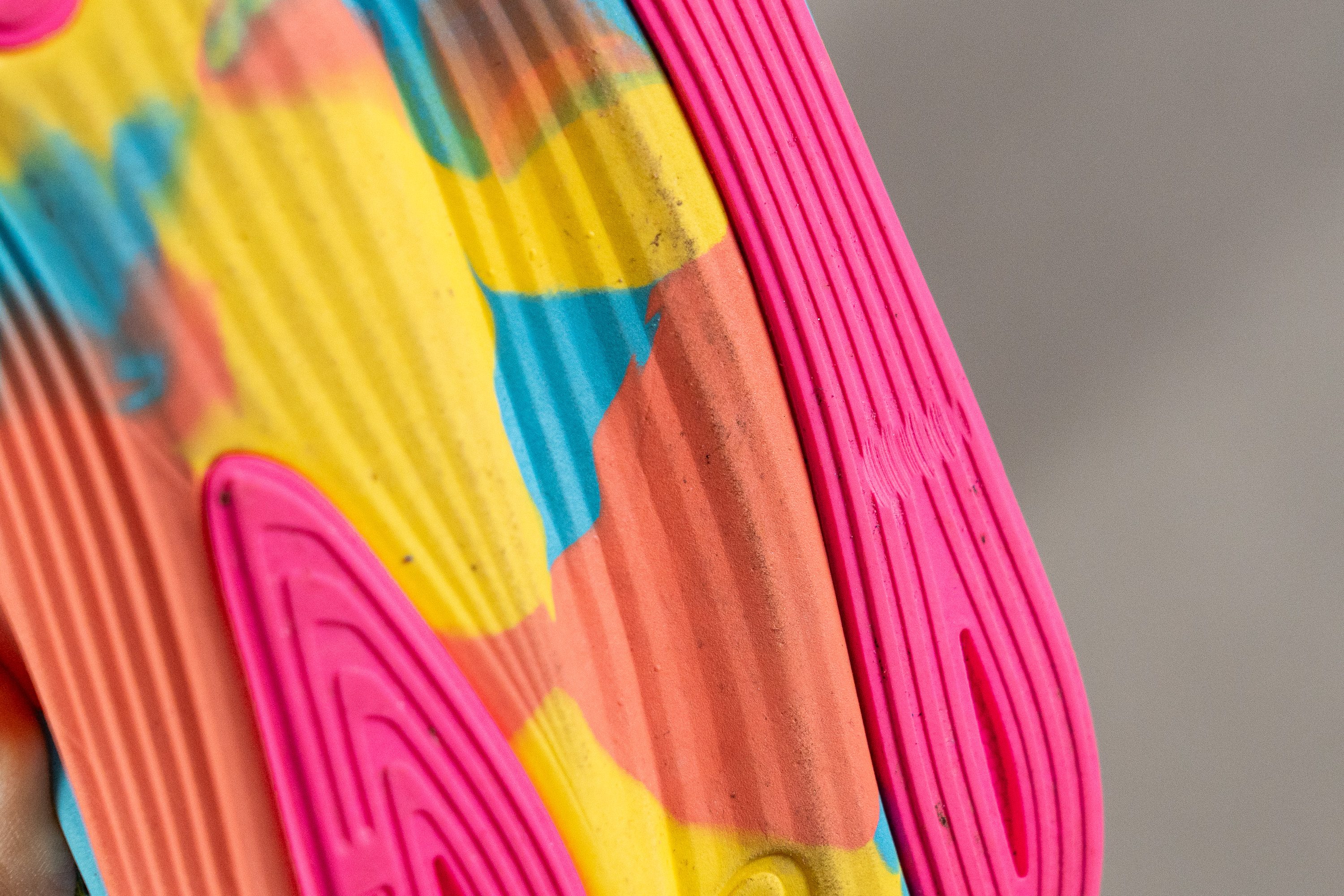
| Noosa Tri 15 | 0.6 mm |
| Average | 1.1 mm |
Outsole thickness
Last but not least, we were eager to find out the outsole thickness. All the earlier tests wouldn't mean much if the rubber was paper-thin, right?
Luckily, we measured a substantial 2.8 mm thickness. This promises that the shoe is built to last, easily covering hundreds of miles with barely any wear and tear.
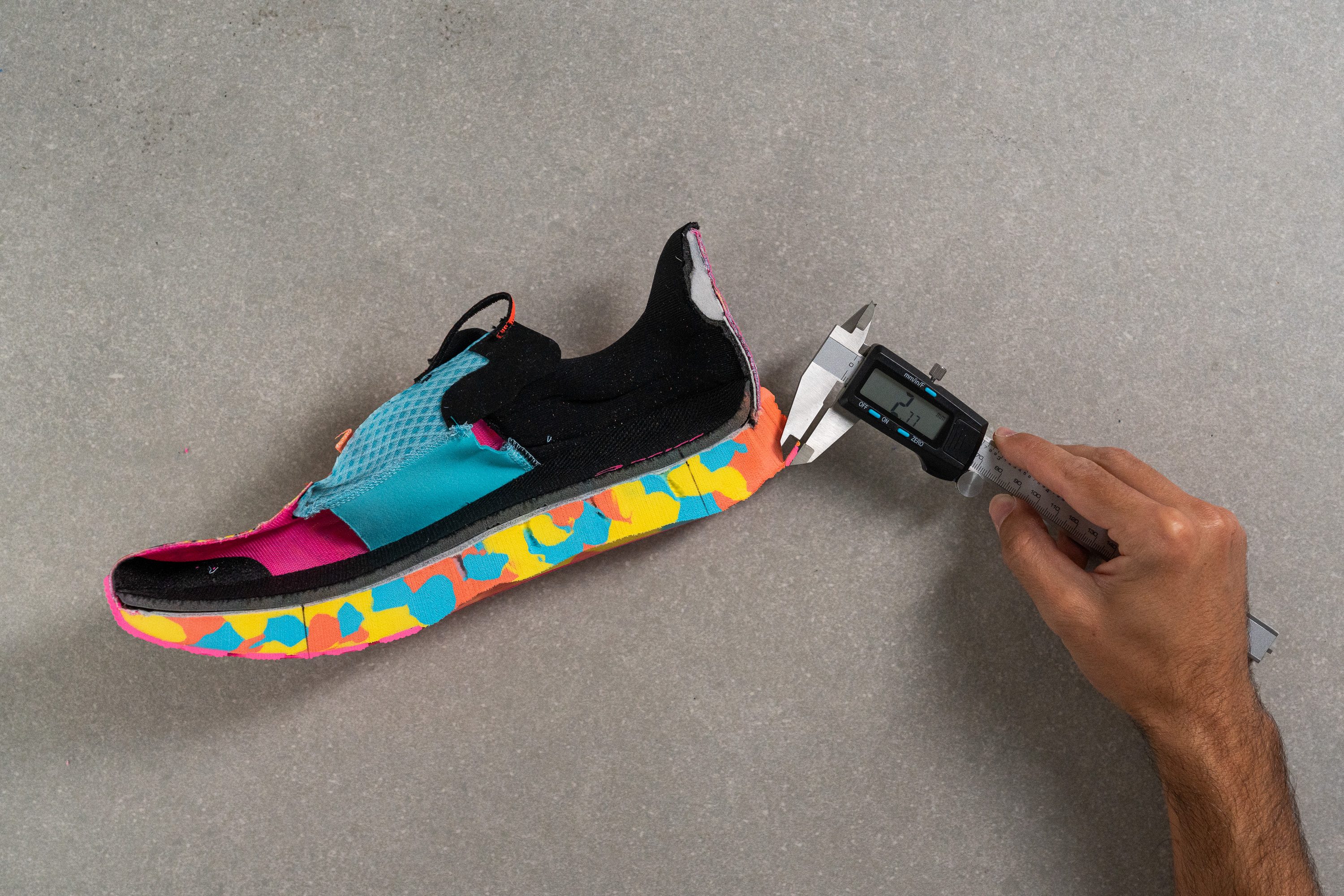
| Noosa Tri 15 | 2.8 mm |
| Average | 3.2 mm |
Misc
Insole thickness
The insole thickness really stands out at 5.3 mm, which is notably higher than average, especially for a shoe focused on speed. This clearly shows that ASICS is committed to maintaining comfort.
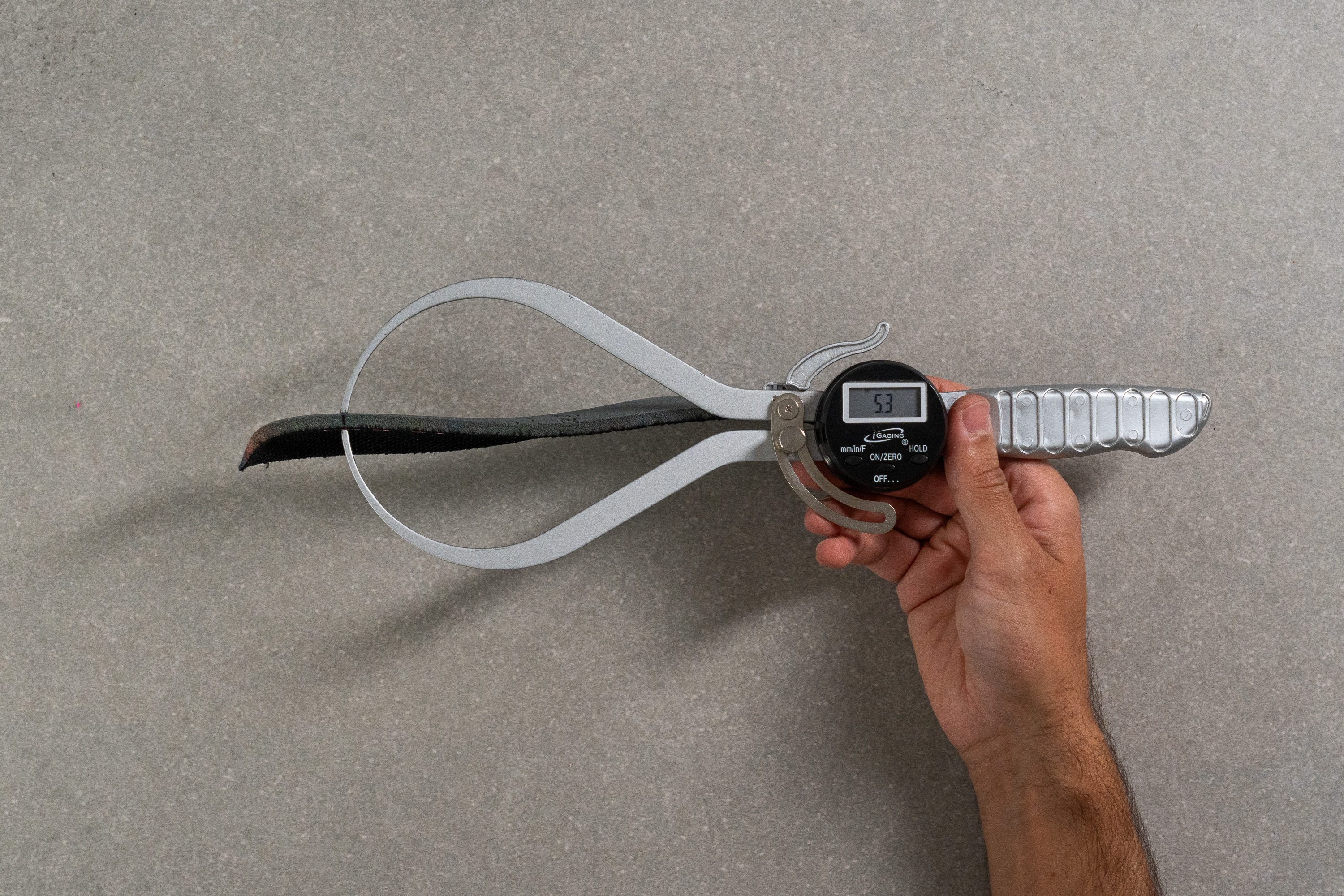
| Noosa Tri 15 | 5.3 mm |
| Average | 4.5 mm |
Removable insole
We know that some triathletes like to switch out the default insole. Good news, is not glued, so you can easily make that change too!
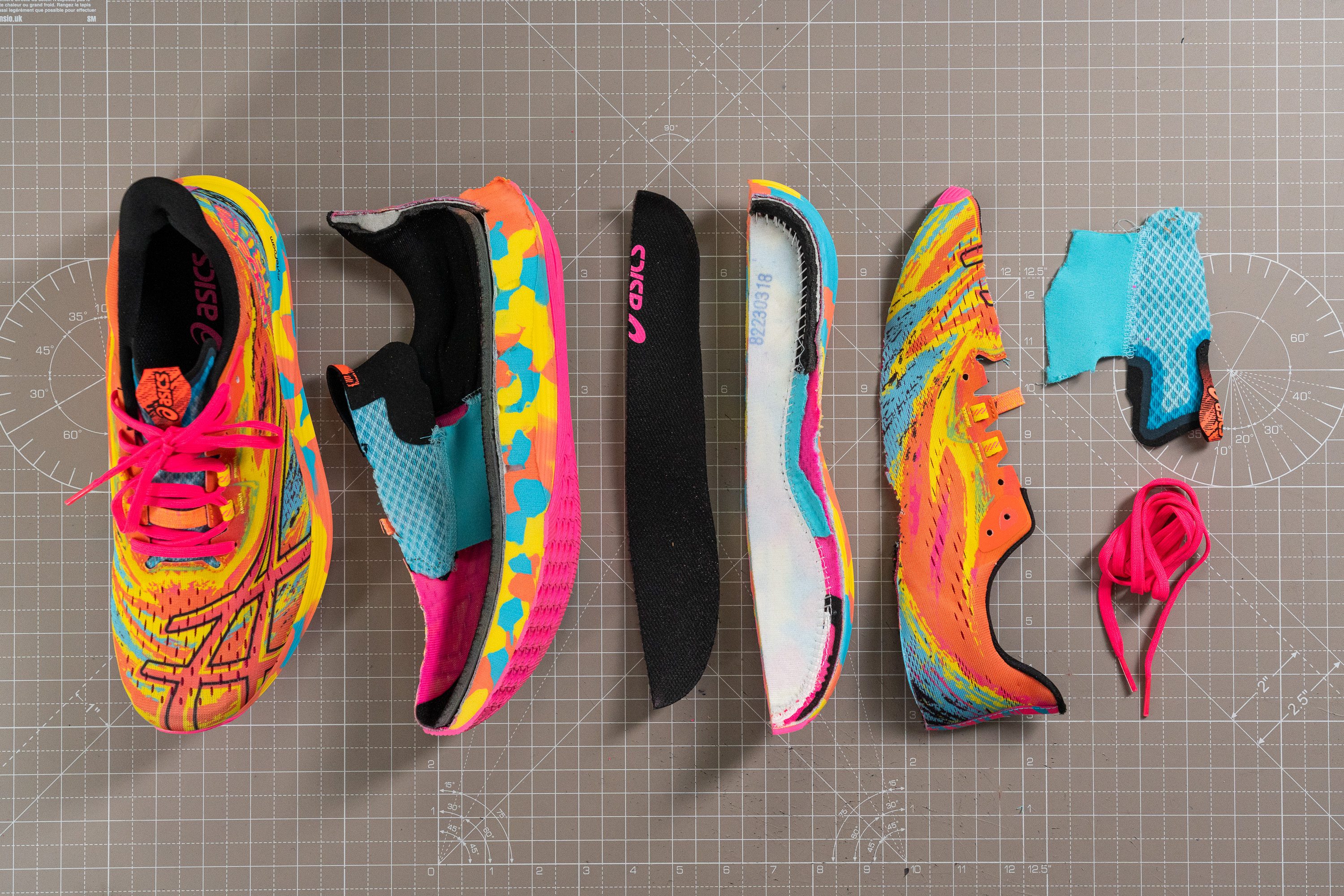
| Noosa Tri 15 | Yes |
Midsole softness in cold (%)
Even though triathlons typically aren't held in cold weather, we're aware that this shoe gets used year-round for training and racing purposes. So we decided to see how it fares in chilly conditions.
We placed the shoe in the freezer, right beside our favourite ice creams, for 20 minutes. After taking it out, we tested its softness with the durometer once more. The reading came out to be 22.5 HA, which is nearly identical to its initial measurement. This suggests the shoe maintains its properties well, even in the cold.
The 21% increase in firmness does not exceed what you'd find in an average shoe.
Although FlyteFoam Blast hasn't historically been the best foam for cold-weather performance, it's evident to us that ASICS is making strides to improve its formula, as indicated by these results.
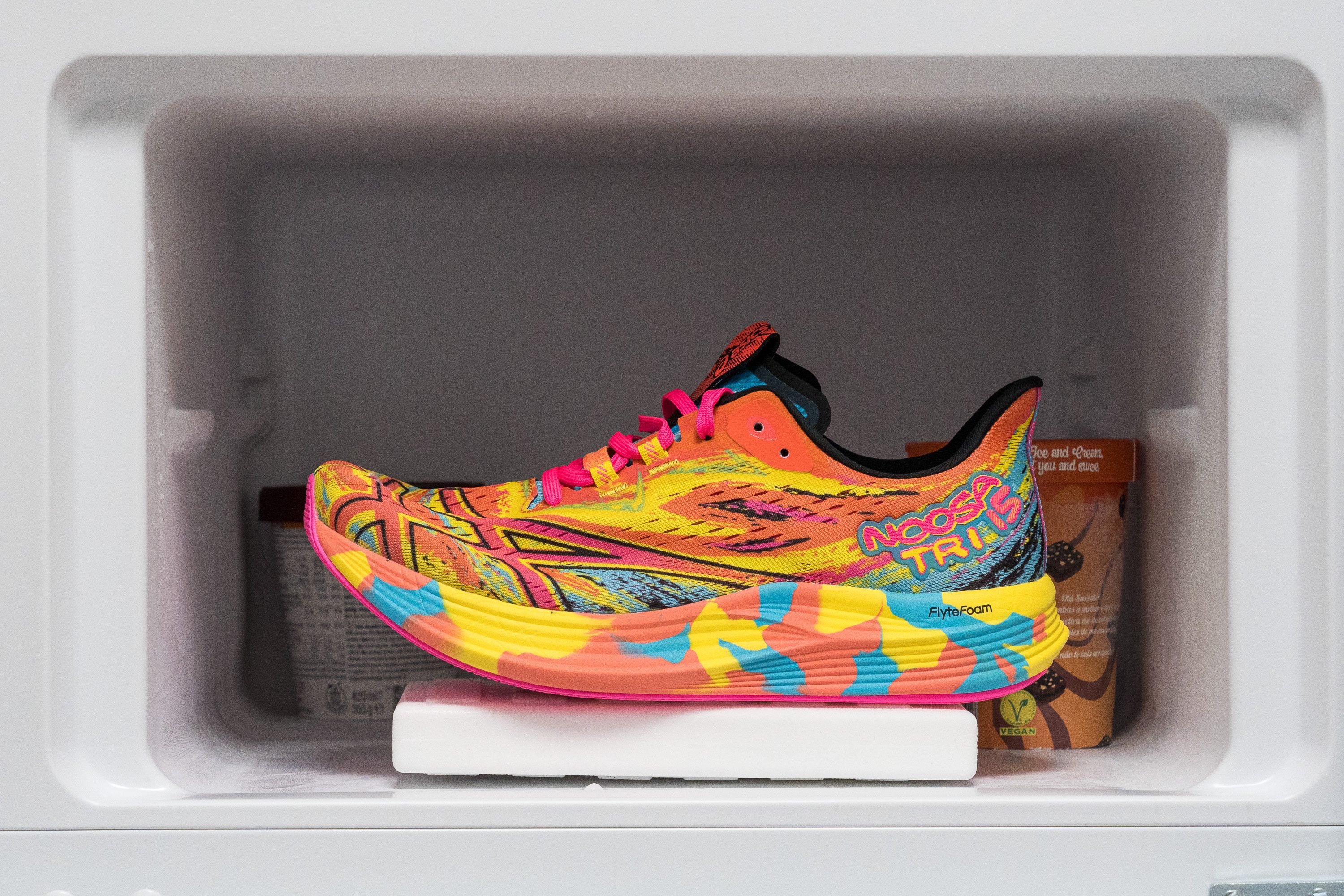
| Noosa Tri 15 | 21% |
| Average | 24% |
Tongue padding
The tongue of the shoe is super-thin at just 1.1 mm, focusing on weight-reduction like a Formula 1 car.
Although it has minimal padding, we find it comfy enough for races and high-speed training, so we're good with this design.
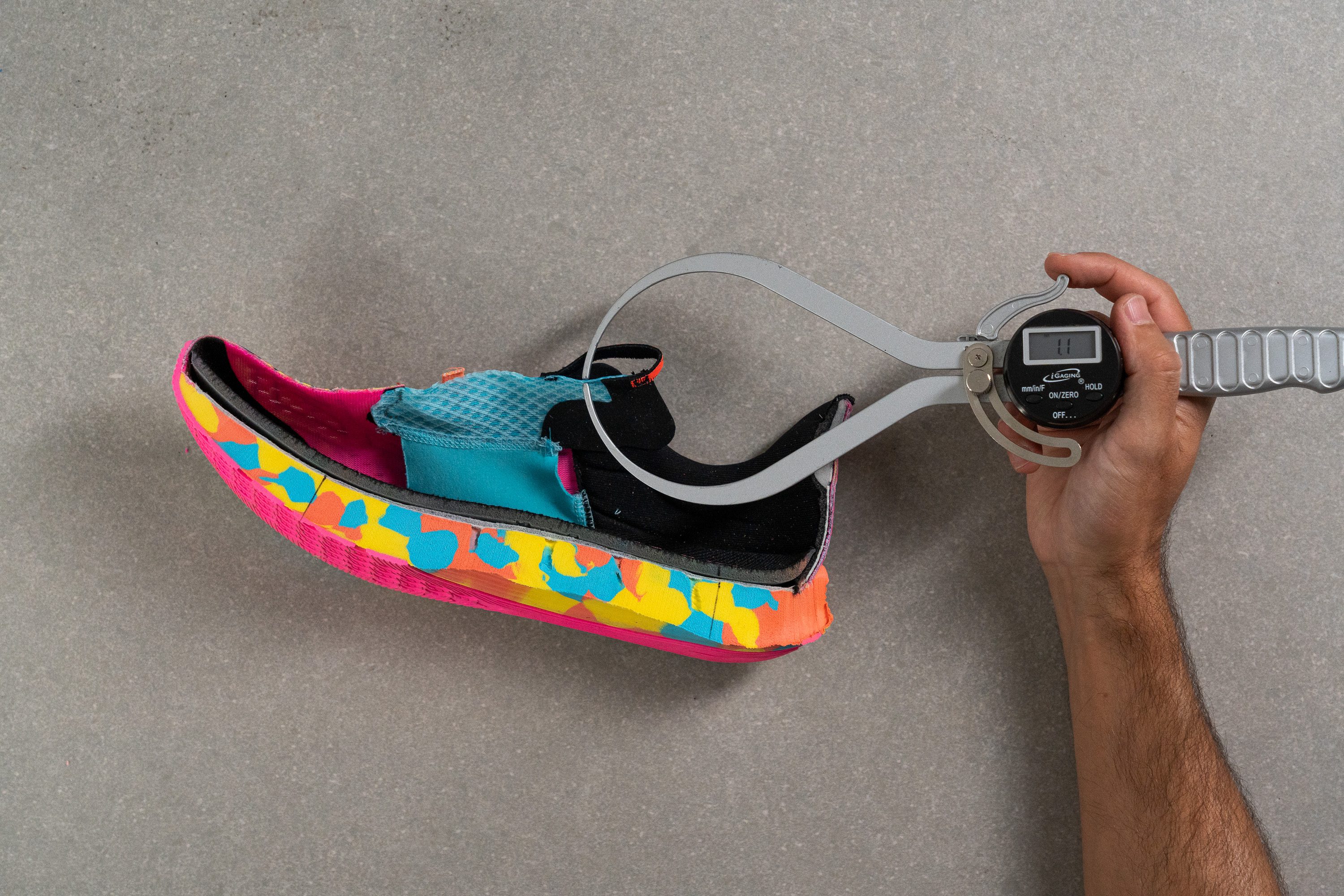
| Noosa Tri 15 | 1.1 mm |
| Average | 5.7 mm |
Tongue: gusset type
The tongue is semi-gusseted, an essential feature in a triathlon-focused shoe that helps prevent any unwanted movement.

ASICS has also cleverly included a tongue tab, not just to make putting the shoe on quicker and easier, but also to improve transitions from bike to run.
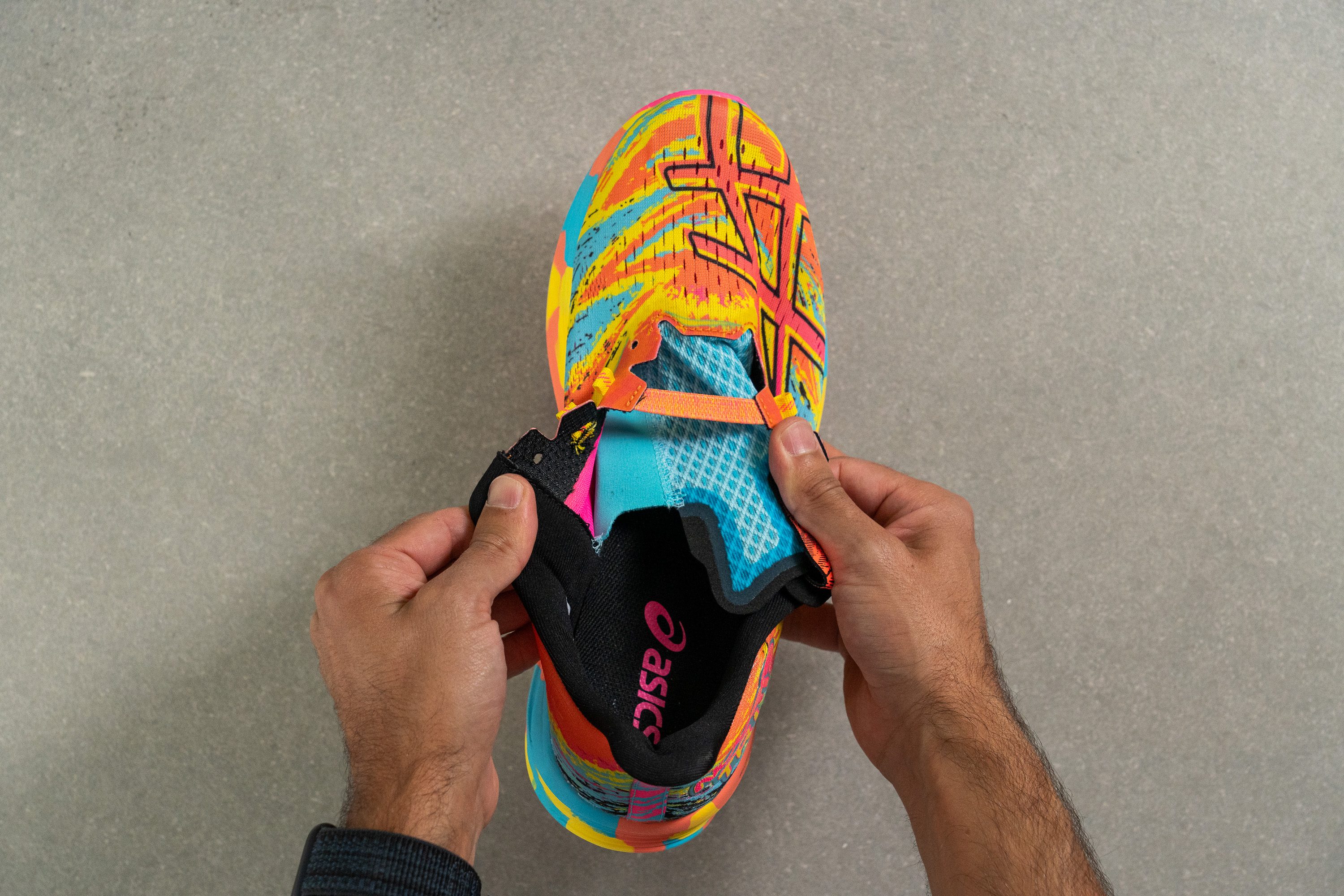
| Noosa Tri 15 | Both sides (semi) |
Heel tab
ASICS decided not to include a heel tab in the Noosa Tri 15. So if you're trying to slide your foot into the shoe, you'll still probably need to use your finger to help.
Maybe they'll think about adding it next year!
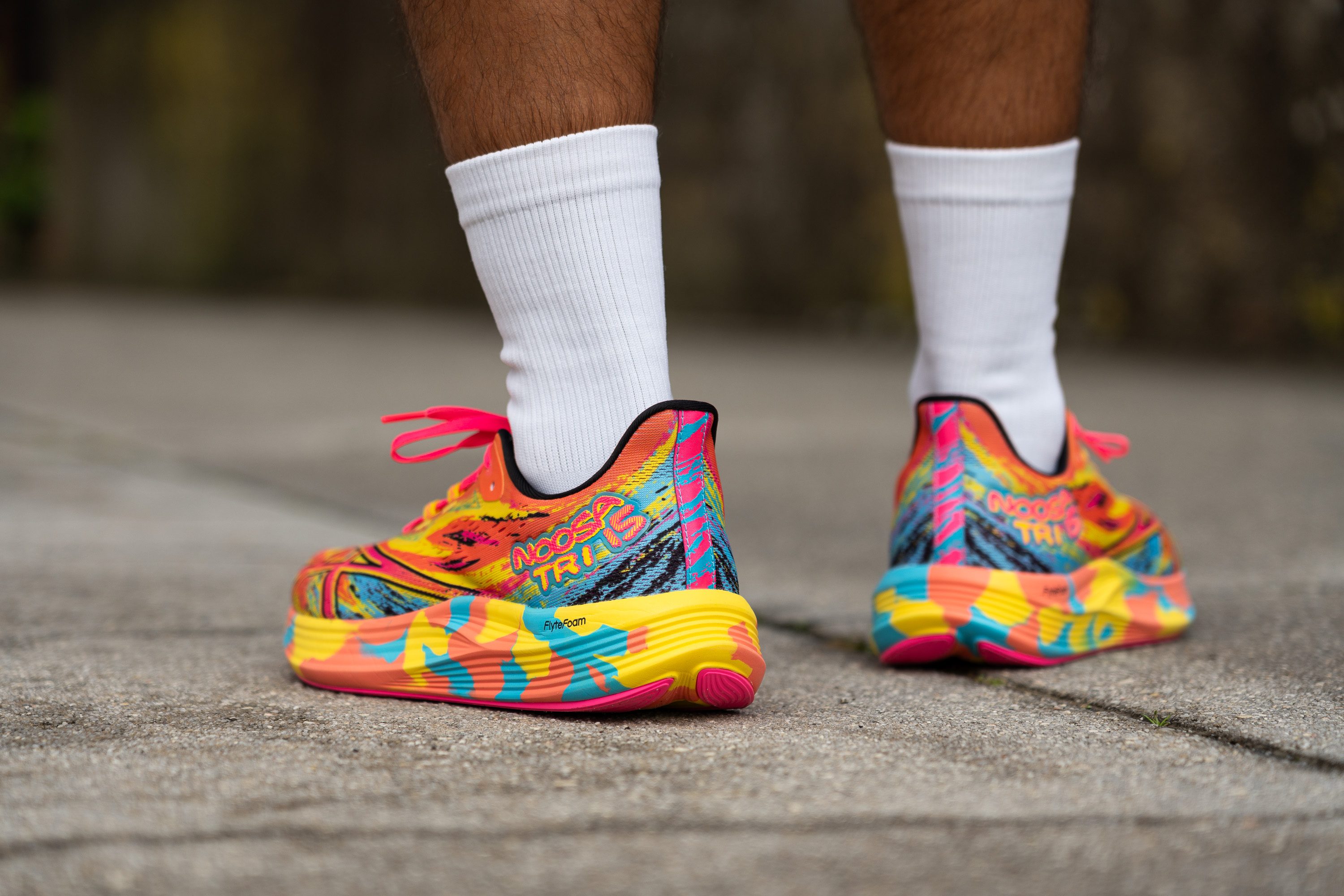
| Noosa Tri 15 | None |

